- Home
- Collections
- CLARKSON JV
- Grandmother Remembers - Memoirs of Alice Clarkson 1944
Grandmother Remembers – Memoirs of Alice Clarkson 1944
“Grandmother Remembers”
The young people are always asking me to write down some of the memories of my long life. As I am now in this year of World War and turmoil, 1944 and aged 87, I am afraid they will be sketchy or perhaps dealing with times so long past, they will fail to interest youth, but it seems the fashion to write one’s memoirs, and we get a number of novels based on the past. This is not a novel – merely family’s facts and experience as I remember them, and therefore perhaps will be of interest to my own descendants. So to work!
I was born at a country place near Port Elizabeth in the Eastern province of the Cape Colony, called Mount Pleasant on September 4th 1857, the youngest of our family. Three sisters and one brother preceded me – Mary Ellen born in 1846, Agnes 1847, Mina Ellen 1850, and Spencer Charles 1853. I think I shall walk backward in time – like a crab – and start with some details of my dear parents, as they were told to me.
W.H. Coleman left Colchester, Essex, England, when twenty one years of age in 1837, I believe, much against his father’s wish. Those were days when South Africa seemed very far away. He was offered any farm in reason if he would only remain in England if farming was his wish and aim in life, but no, he was all for “the wide open spaces”, so he had his portion given him, and with money his mother had left him sailed for a new country.
Deciding on the Eastern Provinces where there were many English settlers, as a settling place, he bought land in the Witteberg (Snow Mountains), in the Graaf Keinet district. As the name implies it was high country and good for sheep, for which he imported shepherds and collie dogs from Scotland. Being inexperienced, he also engaged a Manager, and I think spent most of his time in Grahamstown, where as a handsome young man of leisure he made many young friends – their names still have associations in those parts – Southeys, Ogilvies, Curries etc. At the end of seven years he decided to return home, and sold out with some thousands to show for his exile. Providence however took a hand in his future movements, and as he travelled slowly westward to Cape Town, he met my mother, and his fate was sealed. She told us the story of meeting, how on a cold wet day with her face wrapped in red flannel because of a swollen painful jaw, she walked into the sitting-room to find a visitor, and that a strange young man – how she shrank behind her elders. She was only eighteen. To get out of sight and next to the fire!
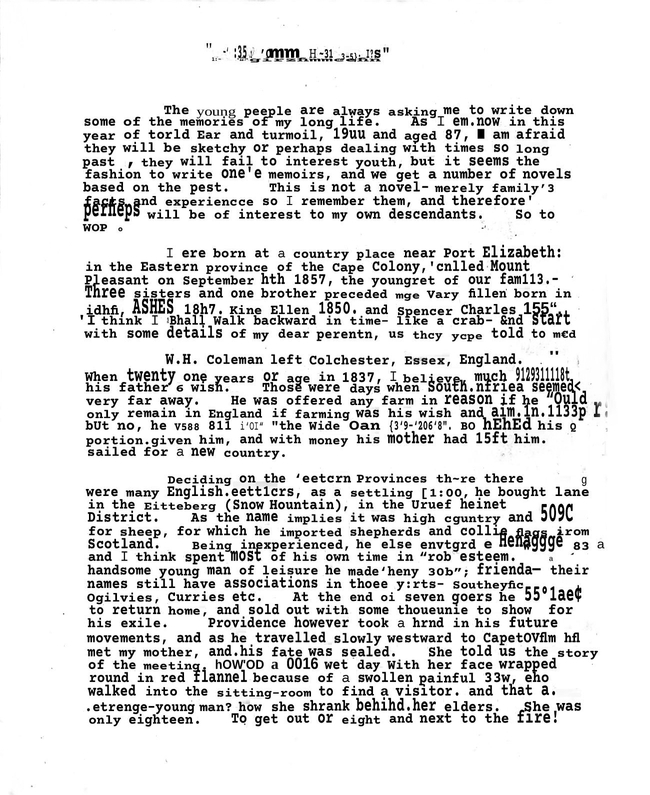
-74-
whose home he was to become an inmate, and where he remained several years, until he returned to Zevenfontein, to the home of Jeffery Edwards, where he died of the worldwide scourge of influenza in 1918. Another outfit had to be procured, named etc., and I was full of work (by now well used to that sort of thing) until I had left my charge in the proper hands and took my way home again.”
And now came a time of great debate between my husband and myself. Our experiences of taking four of the second generation to school at such long distances and the expenses involved. In these first cases the gifts of relatives interested in their welfare and also the orphans, showed us how impossible it would be for us to be able to do the same on our own, when their age demanded the expense.
We had in this year entered into an agreement with the Oceania Co. (already mentioned) to lease the salt works for a term of years at a fixed price, and already a home was being built on the other side of the pan for the manager, our friend Mr. Henly. This arrangement was considered to be in the best interests of all concerned, as it secured a regular income, which had to be divided for the benefit (their half share) of the six children of my sister, M. Edwards. If left us individually with the rest of the property as a farming proposition, and I have already given some idea of the uncertainty of results owing to the difficulties that might arise quite beyond control or management. A year or two of successful conditions might be swept away in a few hours by a visitation of locusts, or a murrain among cattle, and the owner must begin again. A nice home was not enough, and the salt income when divided small. Another matter for consideration was the racial antagonism which was growing in intensity increased by the Jameson raid which was deeply resented by most Britishers living in the country as derogatory to our prestige and dignity. It made us realise that our position had been badly endangered generally. We were constantly subjected to open expressions of hatred to Britain and the English people. Especially I remember on one occasion when the local Veldt Cornet (equivalent to our Justice of the Peace but with military authority as well) coming on business and being entertained in our home produced a small son of about four years, and placing him in a prominent position interrogated him thus “What are you going to do when you are a man?” (Ans.) “Buy a gun” “And what will you do with the gun?” (Ans.) “Shoot Englishmen.” This prideful exhibition over, the proud father proceeded to tell us how easily the Boers would be able to drive the English into the sea “before breakfast” he added. This was the man to whom my husband on his return from England had sent a gift of a very smart cavalry bridle. “What did the Baas say” he asked

-75-
the native on his return, and he replied “He asked me where the saddle was Baas”. And that was typical of their attitude towards every gift, and helping hand that they as a people had received from the hated British.
Under the ruling of the Republic every man capable of bearing arms was registered as a burgher of the State, and provided with a gun. This proved a very necessary ally in case of native aggression, when all would be required to defend the country. But a different proposition was before the Englishman. If his nation was to be the enemy when would he be expected to take up arms against them. That war between Boer and Briton was apparently inevitable was the general opinion.
Thus we had a third problem. Why stay and face such an issue? My husband after ten years of life in the Transvaal, and in constant contact with the Boers in many forms did not like the prospect of having his children grow up to make their livings among the surrounding which would be inevitable. Problems such as these forced themselves upon us daily, and we discussed them from every angle. Not the least difficulty was the question of where we should go with our big family, and all the responsibilities involved.
About this time (I write of 1897) we had a lot of literature sent to us (by an old gentleman friend, an ex-army man) on New Zealand, a country we barely knew of, and certainly nothing of life as lived there. The literature was very interesting and above all it held the greatest attraction of all. It was 100% British and our souls and minds ached for the ways and mentality of our own people. Capt. Baillie in sending these papers added “If I were a young man I would go there at once.”
Finally my husband decided that he should go and see things for himself, before deciding, and left for New Zealand early in January 1898. By nature and taste a farmer he liked the prospect of sheepfarming in a temperate country suited to the purpose, and less subject to disease, and under a more enlightened Government. In the Transvaal the attempts at stamping out disease amongst stock was almost considered irreligious, and however one more enlightened farmer might us scientific methods to check the spread his neighbours’ infected stock remained a menace. I planned and prepared by sewing etc. during his absence, and waited for news of his findings. He took a six weeks’ railway pass, which compassed both Islands, and spent that time on a tour of inspection. One letter I remember showed the impression so far received. It said
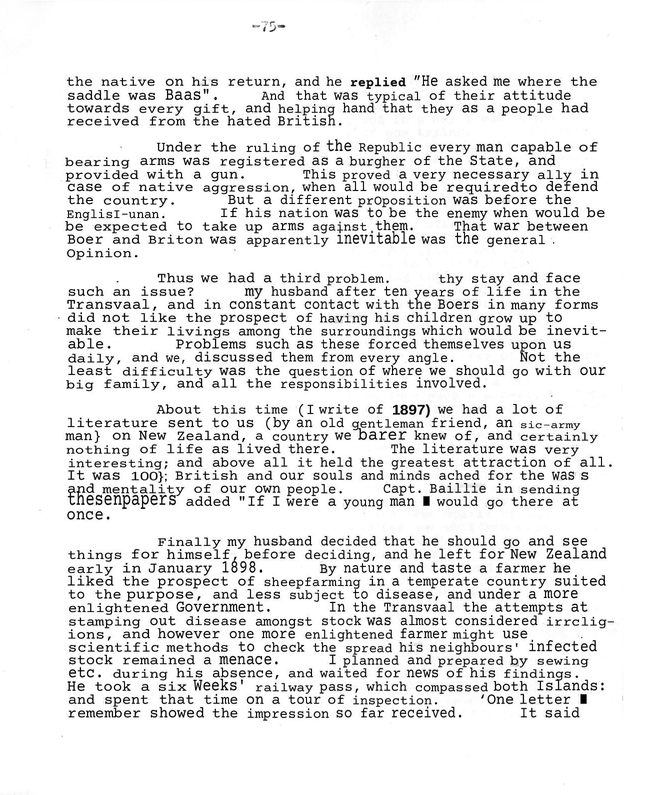
-76-
“I do not see any prospects of making a fortune in this country, but a comfortable home under peaceful conditions.” This moderate estimate came from a man who by nature was moderate and not attracted by the superficial, and in a way I was prepared to hear that he favoured the idea of our trying. He told us one experience he had when at an hotel table in a town called Napier in the North Island, and getting into conversation with an elderly settler he mentioned his reasons for visiting New Zealand, and his interest in sheepfarming. “You come and stay with me” said this settler. “I will show you what sheep farming is like.” As E.C. was on his way north to join his ship he reluctantly refused this tempting offer, but added that he would be glad to do so when he returned later. Said his new friend “Come and stay as long as you like”, and on being informed that when he came again he would be bringing a family, and they would number eleven. “Bring them all – bring them all was the answer and he meant it. On his return to South Africa the final decision was made, and no time wasted. I think friends though us reckless, and we must have seemed so. When I look back I feel appalled at our temerity. My husband the responsible head of our mixed household (really four separate families) was only 42 and I his partner and sharer of all these same responsibilities was 40. Looking back through the 46 years that have passed since then there can only be one explanation for our determination to take such a momentous step, or our being able to carry it out safely, and that was the hand and guidance of God, whom we trusted on and prayed to daily for help in our heavy task. It must have seemed almost fantastic to our friends, that we should decide to turn our back on the land of promise, as the Transvaal seemed to those who were daily finding new minerals, an Eldorado in prospecting for the seekers for gold and precious stones, in fact the opening up of endless channels of wealth, but when we left there were many other factors to be faced, and we lacked the true spirit of the speculator, in fact feared it; and for our children especially wished rather for security and peace of mind. So the die was cast and preparations soon in full swing. Oh what it involved the dismembering of two households and their accumulations. Only personal belongings could be taken with us or treasures of which travel and bad servants had left but few. Pictures with associations, some of my own painting, (and the result of much amateur travail) and other breakables I packed in a huge case amongst the newly washed and teased horse hair of my earliest mattress that came from Home with our furniture in 1889. A buoyant resilient packing and only one breakage was found after the long long journey by wagon, train and steamer (later when we finally moved to our permanent home in New Zealand the horsehair was made up by me into a mattress again, and served its original purpose and still survives in that
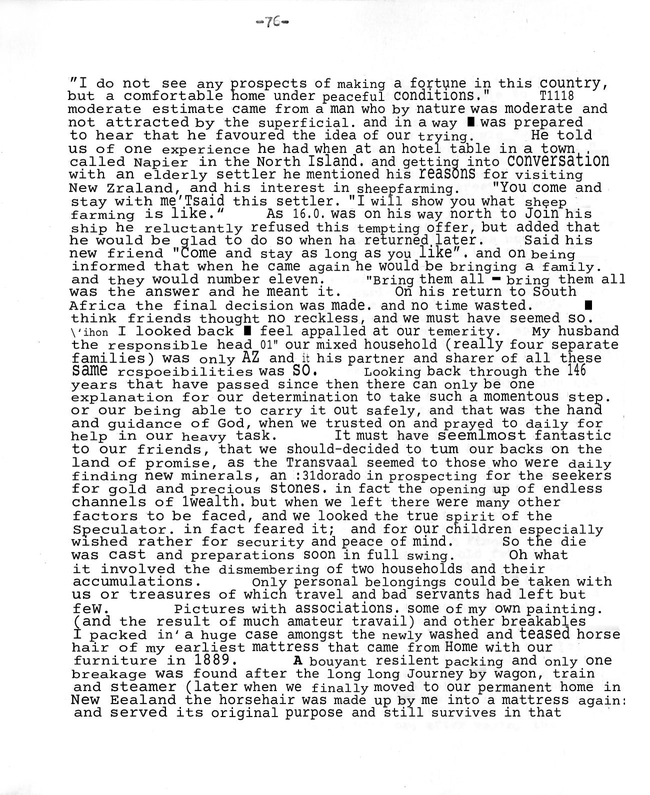
-77-
capacity.) Eleven big cases, finally left with the family when in August we sent the eight children with Aggie to Cape Town, there to await our coming. A friend accompanied them to the rail head in Kimberley, and did a man’s part on our behalf. It was a heavy day for we elders. My dear Aggie who did not ever question any decision made by her brother and sister had a tragic farewell to say to her beloved dead. That small God’s acre held our dear ones ever present to her faithful heart. It had been her special care and the loss was great. Our friends the McEvoys had laid a baby daughter to rest there, and an English friend, who had sought for health in our dry climate, and had not found it, and also shared the sacred enclosure, and we left all in the hands of the friends whose home was now close at hand, little knowing what the future held in the way of ravage and pillage when war stalked the land. My husband & I had now to prepare for an unreserved sale of that big household. I grieved over my comforts and luxuries, that had grown round us and made life something removed from the ugly and ordinary. E.C. assured me I could replace them in the new land, but I knew better, and indeed it was many years before we could spend money for ought but necessities. The sale attracted buyers from far and wide, and preparing for it was heavy work and heartbreaking. I could not face it and spent a sad sad day with Mrs McEvoy. In fact that was our home until we left. So many years ago that leaving, and I still remember the goodbyes to faithful servants, the old natives who came weeping, and asked who would take the place of their father and mother, for in that capacity they had come to us in their extremity in sickness for remedies, and in death for a shroud. They hated the break up of their established dependence. I sometimes wonder if we had realised what a wrench was before us, whether we would have persisted in our exodus. But our boats were burnt already, and we had resolutely to put all our regrets behind us, and face our new decisions and plans for life in a new world bravely. So we joined the family waiting for us in Capetown, both very tired and needing rest. We had not long for much final fitting out of the family and ourselves kept us busy, and old friends to farewell. Among them was Mr. Richard Southey, my father’s old friend, who with his wife had given Mina and myself so much pleasure in our young days, when he was Governor of the Diamond Fields. He regretted he said that he had not known of our intended move, or he could have given us many letters through Sir George Grey, which we might find useful. We did not tell him that we had many letters already to highly placed people, but did not intend to use them until firmly established ourselves, my husband having shrewdly noticed that it was very easy to spend money in New Zealand without realising how much had best be saved for unexpected calls. In fact the newcomer had best feel his feet on firm ground before exhausting his capital. We were taking a very modest amount with us, after paying the

-78-
travelling expenses by land and sea of our big party, but we were leaving behind us, combined investments which we depended upon to produce an income, which would support us until such time as we could add to it. Meanwhile care must be our watchword in every way.
I had my 41st birthday while we waited for the old S.S. “Kaikoura” which was to take us as passengers, and when we finally boarded that comfortable boat we must have looked as we felt. We travelled second class as befitting our new economies, had splendid accommodation belonging to those days, and a very fine Captain (Forbes by name) who never failed to visit us when his ship was in port, and body of officers. The voyage was pleasant, as we found our fellow passengers agreeable and joined in the many entertainments, mostly musical which my husband, with his violin, and I contributed to, and the young folk, especially the girls, enjoyed the dances etc. So we reached our desired haven after a short call at Tasmania, which seemed to me full of sad history, and I was glad to leave.
And now this chapter of my memories comes to an end. It is a long one reaching from September 4th 1857 to October 5th 1898, and now to justify our decision and start on a new kind of life.
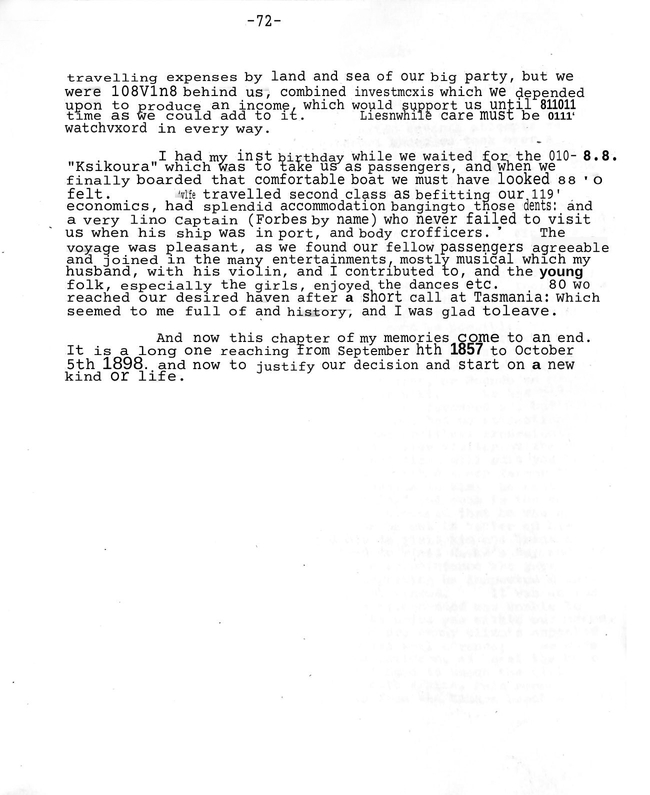
-79-
MEMORIES OF LIFE IN NEW ZEALAND.
And now to start life in a new country under untried conditions. We arrived in Wellington on October 5th 1898, went to a quiet simple hotel and started at once to search for a house to occupy temporarily and after several attempts we finally decided on premises in Karori where we took over a house just big enough for us to crowd into. Five bedrooms, a sitting room and dining room, with good back premises. The furnishing came next – every room had to contain two beds, some three, they had to be of the stretcher variety (except our double) and no extras could be avoided. A glassed-in porch on the sunny side was useful. The place was in good order and we looked upon our residence there as temporary. Visitors began to arrive and the first were the nicest of all, the Gavins, who were kindness personified and helped us in many ways to settle down. This suburb of Wellington was reached by horse bus and suited our present needs – school next door, local shops of a simple variety. We settled down to its simplicity and had a busy time doing it. My husband left us to this business and started on his quest for land as soon as possible. I went with him to look at some newly developed land in the Marlborough district but we soon decided that it would be a hard and long task before any profits could be forthcoming, and returned after enjoying a peep of the lovely Fiords, or Sounds as named here. His next exploration was Taranaki. We had been advised that many newcomers from overseas favoured it, but not my man. The climate, and mud everywhere, had no attractions for him, and he was in Wanganui after some fruitless excursions, when he got into conversation with a fellow visitor at the Hotel, who said “Hawke’s Bay climate and conditions will suit you best, I think. My father is a well-established sheep farmer there and I can give you a note of introduction to him; he could perhaps tell you of something suitable,” and such is the wonder of life’s happenings, that he soon discovered that the was speaking to the son of the hospitable man he met in Napier on his previous visit, who had invited him to visit him and bring a big family with him. He decided to visit Hawke’s Bay and did so, being welcomed by his hospitable acquaintance who gave him much valuable advice and at whose suggestion he inspected a small sheep run of 1200 acres in the neighbourhood. It was on the market as the owner who farmed it single-handed was unable to carry on owing to ill-health. The price was within our means, stock at valuation and above all the dry sunny climate appealed to his taste. By the time 1889 was well advanced; we were settled to a certain extent. The children, at least the boys were at the Public School, Raby continued to teach the girls. We found the climate trying after South Africa, rain seemed ceaseless and the wet mists came up from the Makara beach and met
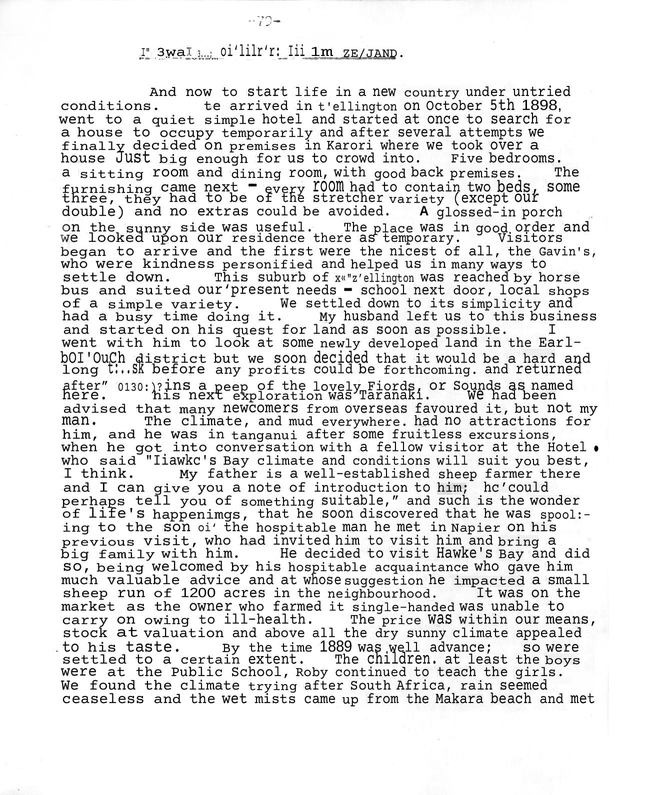
-80-
the wet mists on the hill tops. I complained that the kitchen range held more boys’ boots drying than food; books moulded on their shelves and we found the “Help” business tragic. A woman to wash and another to clean on separate days had been carefully arranged for but our experience was that they came when they chose and I found often that my inexperience had to handle both problems and often I cried out for my native help – but all that happened was I learned to do things myself that were unaccustomed and we helped each other. To complicate matters the children all developed whooping cough and I followed suit. It was always like a small hospital when epidemics visited us, we were so many and very vulnerable after our isolated lives in South Africa. We made kind friends and were fortunate in having a splendid Vicar at the only place of worship where I sang in the choir and eventually our four eldest members of the family confirmed (in our second year). Towards the end of 1899 my husband sent for me to join him in Napier to look over Glenlyon before finally closing the purchase. After making many inspections of offered properties he seemed to have returned to his first one. I remember the pleasure I felt in wearing a light, cool evening frock to dinner at Napier the night I arrived by sea, and strolling later outside on the Parade, a delightful change from shivering in woollies for so long. My first sight of the proposed new home I grant was depressing, grey skies unfortunately added to the feeling. We drove there from Mr. D. McLean’s big station in a borrowed trap and after a long climb among rounding hills for about nine miles we topped a rise and looked into a green, quiet cup – No trace of life; on the facing slope a small four roomed cottage stood alone with a small frontal garden; a shearing shed and stock yards were below the road which edged the lip of the cup. I remember the feeling of being surrounded as in a prison – nearly choked. (I did not realise the value of shelter then.) After our wide open spaces in South Africa it was not attractive. Only the greenness of the grassed hills was welcome. I had come to pass a verdict; but it was easy to see that my man had decided upon its suitability. Here he was going to learn to be a New Zealand sheep farmer, and he looked for no other values, so we inspected every detail, and planned enlargements to the cottage, and returned to Napier to put the purchase through. The night before I left him to return to Wellington we went to the theatre and during the interval a tragic notice was shown on the screen – “Great Britain had declared war on the Transvaal.” Though daily expected, the news was very exciting, especially to us, who could only feel relief that we had escaped in time from the unpleasant conditions, that must prevail, but with the usual British optimism everyone was absolutely certain that three months would see the end of hostilities, and a reign of law and order where there had been
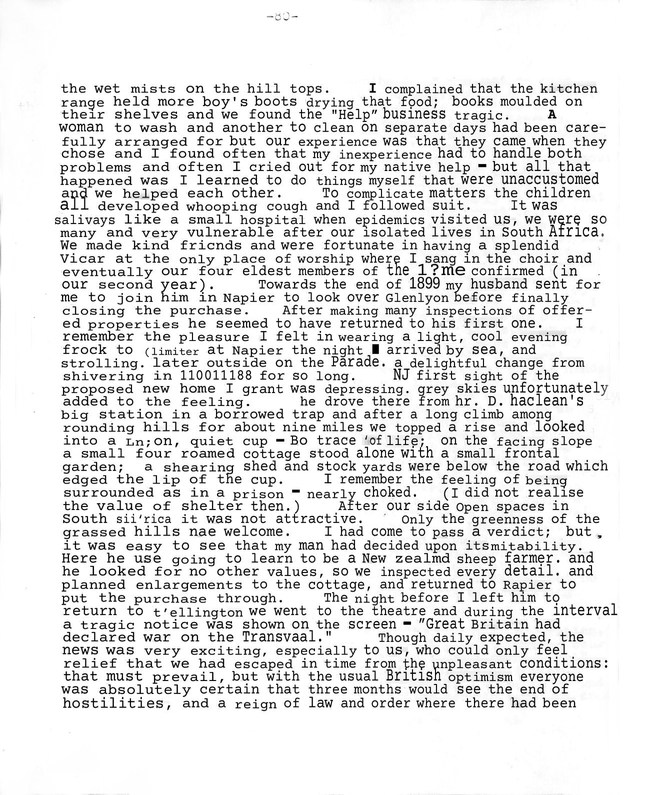
-81-
chaos. Even E.C. gave it six months. I was not so sure. The Boers had had such a victory at Majuba Hill they could never realise that England under Gladstone would not continue the fight, because their policy was to avoid foreign commitments. How could they, so ignorant and uneducated as a race, that they had to employ foreigners (Dr. Leyda of Holland was head virtually of the Government when we left and all his staff. Kruger could barely sign his own name.) realise the strength of the British Empire, and its capabilities. It was not long before the facts became more and more certain, and it was early in 1900 that my husband wrote me a letter which confirmed my worst fears. With things as they were in South Africa there was no hope of receiving interest on money due from that country for an uncertain time, so our only sensible course was to carry on as hitherto. No building or extra expense could be attempted, and in fact one shilling must do the work of two. Having already completed the purchase of the property he proposed living there and carrying on, as well as possible. And nobly he did it. When I realise how uncertain our separation was to be and my own limitations in training single handed the young lives in my care, I know I fell on my knees in desperate fear, and rose to do my best. Both of us had difficulties to face, his the worst, alone, strange to new conditions and ways of living, single handed when used to our love and attention. I look back on his brave facing of endless difficulties with a proud knowledge that he was a man to be proud of, and to depend on. So we settled down to watch and wait. Fortunately we had a bi-weekly mail, and long and regular were the letters that passed between us (to the amusement of the old mail carriers, who, we heard later, had given it as his opinion that that man must be very fond of his wife, he wrote so often to her.) Time passed. My man had many experiences, the sheep proved poor, the winter severe, and many succumbed. He used to tell me how Polly’s feet were snowballed and the dog almost unable to walk. Yes! he learned like the others – by experience. His kind old neighbour was very hospitable and Paparangi [Poporangi?] expected him for weekends. One son went to South Africa, and never returned, and so did many another New Zealander. We were able to interest many parents having so recently come from there, but no one looked for a 3 years war, and the prospects of retrieving anything from the aftermath looked bad.
But time passed and after 8 months of entire separate, which seemed interminable, I had a wonderful gift from those dear old English Aunts – a draft for £50 “which I might find useful”. I lost no time in putting a long thought-of plan into action. If we could not join our dear one in his wee home we would go a live as near him as possible, where sometime he could come and spend
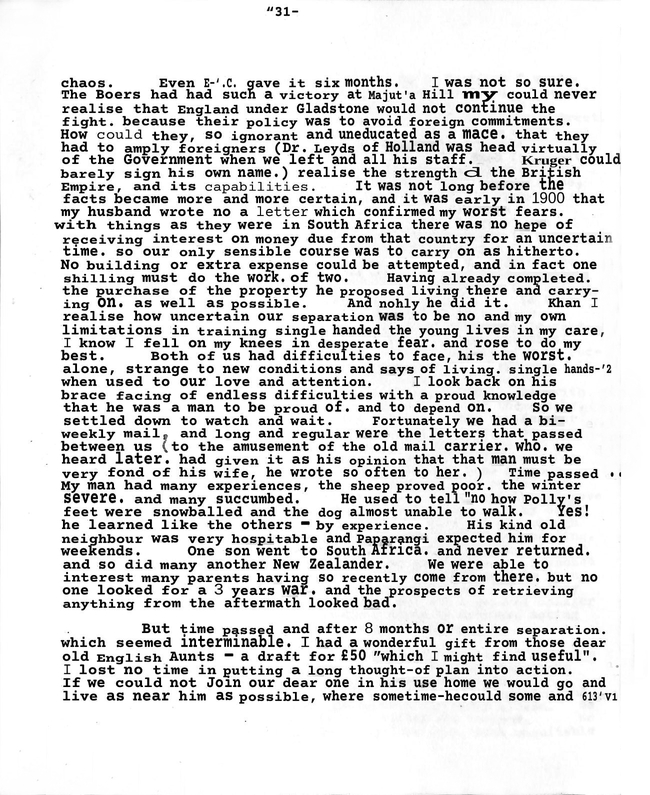
-82-
a weekend so longed for by us all. So to Hastings I went, all on my own, house hunting and found the very thing we needed. It had been a school, and was called “Stonebyres”, a 14 roomed double storied house in the west end of Heretaunga Street. It stood in two acres of land, surrounded by a high, dense macrocarpa hedge, which sheltered it completely from the street. There was only cold water on tap, and the wash house facilities were nil, an iron shed and a pump beside it, but the rent was only 17/6 weekly, and we were only 23 miles from our dear one, and I thought it heaven sent. Our lease at Karori had just lapsed, so we left no obligations. The move was a heavy task, but I had a dear young school boy of 14 to give me a helping hand, and we got all our belongings en route to the rail. I had sent some of the girls to stay with friends and the 3 eldest boys to their father, where they enjoyed the freedom of the farm, and we elders and Eric travelled up with our belongings, reaching Hastings early in 1901, the day before the memorial service for our lost Queen Victoria. We took rooms at the Carlton Club Hotel, and moved in as soon as possible to our new home. I had found it necessary to make some extra purchases – our premises were so large, but that wonderful draft covered all, and we settled in full of satisfaction, that we were 200 miles nearer our goal than before. We had a large diningroom, small sitting room, my own bedroom also large, and Aggie’s bedroom downstairs, a big landing with two big rooms into which 6 bedrooms opened. Of these Raby, Maudie, Ida, Becky and Arthur each had their own. Another held my three boys and one remained for storage purposes. The landing was a comfort it held our sewing machines and a centre table under a swinging lamp, which served the boys for a study and regularly after tea they did their home lessons there, retiring to bed after. When ready they called for me and we had our chapter and prayers and a little talk and love before I tucked them in and left them with God. Raby continued the older girls’ studies, but they were all old enough to take their share in home duties as well – their own mending, some kitchen duties in turn weekly. I was housekeeper and cook in general, they helped me to keep the house. I washed (Oh! that weekly wash starting at dawn) but left each to iron (their own and a share of the boys and house linen and so they got their training by division and method and a general manager and teacher in myself. We had callers by degrees, making friendships which have lasted through the years.
In 1902 Raby decided to train as a nurse and left for Wellington when we had made her outfit – a great loss to us but she said she wanted something positive in the future -. So with the loss of one who was like a dear elder daughter and had always been a great help and comfort our ranks closed. We only very occasionally saw our dear Father and husband. He had only a heavy draught horse and a farm dray, both unsuitable

-83-
for short brief trips to town and I almost felt that our move had been futile as far as closer relations were involved, when one day, rather sad and depressed, I felt an urge to lay our needs before the Lord and ask Him, if good for us, to help. I asked very simply for some vehicle by which the distance could be bridged between our homes. This sounds very materialistic but I rose from my knees in full faith that He who knows our needs and hearts would do what seemed good and in that faith I went cheered and confident. A month passed when one brilliant day as I sat sewing as usual on the landing I heard voices in the yard, and looking out recognized a friend. He was manager of a large station near Glenlyon and generally called in on my husband when passing. Hearing my greeting he looked up and this is what I heard “Will you come down and tell me where I am to put your horse and trap.” With a beating heart I joined him – was this God’s answer. “What nonsense are you talking,” I protested. “No nonsense at all” he replied “This is now your property” and went on to explain “I have left G- and taken a position on the East Coast where I shall have no use for this” pointing to the low seated little trap with its steady blue roan cob. “I want a good home and master for him and have been trying to get your husband to buy the lot, but he swears he can’t afford them and refuses to be tempted, and so in self-defence I have left them in his care, and for your use until later when we will see what can be done.” And so, my children, I was soon on my knees again thanking our Heavenly Father for His fresh mercies. My simple prayer was answered in full, and my dear husband was able to visit us frequently. Little “Steel”, the cob, served us well, and when his master claimed him again we did not require his services. Now I was able to go and help at Glenlyon as housekeeper during the shearing and cook for the few white men, who were at the shed, my first experience of what men could eat at these times in New Zealand. It certainly took some effort, but my man helped me and put me wise and we got through all right, and little “Steel” took us back to Hastings, and a waiting family. Arthur and Neville went to Christchurch that year as cadets to attend the parade in honour of the visit of the then Duke and Duchess of York. I tried to persuade Neville not to go but he was set on this great event, and I saw them off as embryo soldier boys – quite an event with a sea trip or crossing, as well I remember on returning with E.C. from a few days with him, seeing a small figure dash out to meet me with a desperate hug and kiss, and “Oh Mother it’s lovely to be home.” The would-be soldier had found the experience a rough one, and home felt good. We had quite settled in by now, and made many friends, though my duties and our circumstances forbade entertaining. The young folk were happy and busy,
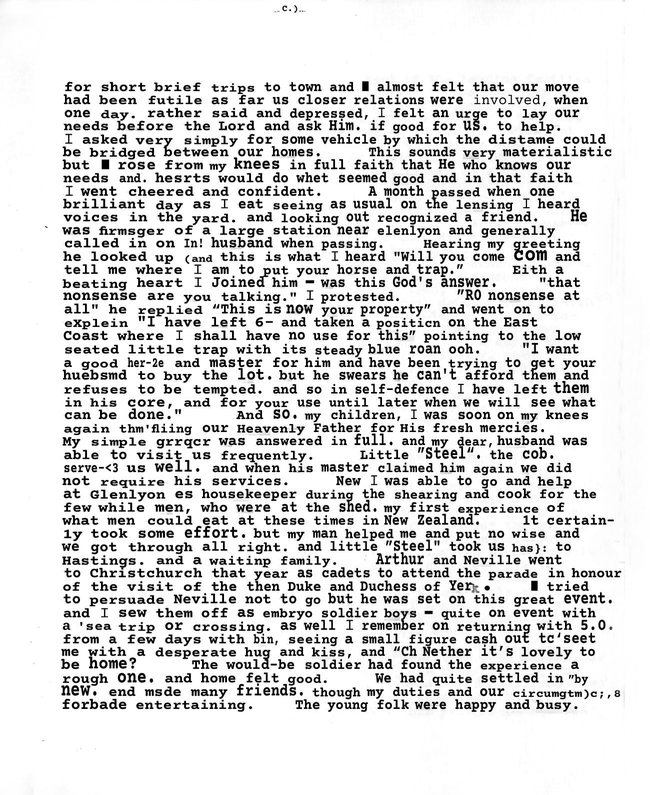
-84-
and Hastings was a quiet town. Most of the leading families had beautiful homes outside the boundary. The Boer war had absorbed many of the young men and entertainments were few. I remember Cinderella parties to which Raby went. To these we took some provisions and came home at 12 p.m. Pleasant occasions but not exciting. Sundays were happy days. All went to service at 11 o’clock at St. Matthews, except the one whose turn it was to look after dinner, always as special as possible. Such a pewful of us from Aggie down to Eric. I can see Neville in his Eton suit (passed down from Arthur’s St. Andrew’s outfit) and the rest in their trim clothes, which I continued to tailor, even their collars. After dinner and a short rest I devoted the rest of the day to the small boys. The older children had all been confirmed before leaving Karori and were no longer having Sunday School from me. I never saw visitors on Sunday. On fine afternoons we sat with our books under the big wattle tree, which was a perfect bower, and later we went for a real country walk, which they loved and so did I. The freedom which we enjoyed together, and I think they felt that mother was all their own instead of having to share her attentions. An early tea, for which I always tried to have an extra delicacy, cake, or special jam etc.. over and cleared away the older members went to service leaving me in charge, and I read aloud to a very interested group, the very best I could procure. “The Finite Ceremony” returns to my memory. What questions had to be answered and what a happy family finally retired to rest.
1901 ended and 1902 came into being. By May of the same year the Boer war came to an end, and E.C., leaving a man in charge left for South Africa to salvage our buried investments from the spoils of three years’ war. He left late in May, and I remember turning my attention by a big effort as the door closed on his departing footsteps and I faced the months before me, cutting out three new dresses for the girls, something that demanded concentration. I dare not brood and so I set myself a task as I have ever done on these occasions when fading footsteps or wheels have torn my lonely heart.
He had barely left New Zealand when a cable arrived announcing the death of his mother. I sent it to Sydney where it reached him. He knew she was failing in health and had hoped to continue his journey from South Africa to visit her once more, but it was not to be. She had been living with her second son Charles for some time before the end. Her daughters all married and Wilcocke, the youngest son, who had chosen South Africa in which to live had died of fever, when on a trip to Chinde in Portuguese Africa, some years before we left. Poor Mother, I don’t think I then recognised how sad

-85-
it must have been for her to lose her beloved elder son for the best years of his manhood. When they parted in 1877 only a voyage for his health had been contemplated, and fate ruled the separation should be life long.
The six months which covered E.C.’s absence were very difficult ones for me financially, budgeting to meet extra expenses, such as music lessons for our children necessitated (we were anxious to give them such advantages while living where teachers were available). A lot of adjustments and anxieties and the continual strain upset my health, and though never laid up for long, spinal neuralgia often necessitated drugs, and as it also caused gastric trouble I had to be very careful in diet etc.
E.C. was due to return about Christmas and I left a family just recovered from measles to go to Wellington to meet him. Raby came to see me in the morning of Christmas Day, her only free hour, and oh how we rejoiced to meet again. Later my man arrived – another joy, and we spent a few days in Wellington – hearing his news. His trip had resulted in securing a modest sum as compensation from the British Government for blowing up our homestead to prevent enemy occupation during the war. He had also sold out our private interests in Johannesburg (unfortunately at reduced prices, as South Africa suffered badly from a slump when hostilities ceased.) However – he wisely concluded that the cash could be best invested in New Zealand in our new interests. Added to his share of his late mother’s estate, it was possible for us to add a larger acreage to Glenlyon, which brought us on to a road much easier of access, and with some acres of flat ground to hold a larger house and place the woolshed and outer buildings. We had now a small station (as considered in those days) of 4000 acres. House building was started as soon as possible. We added to an existing four roomed cottage, and finally had a very comfortable home. A large living room panelled in handsome New Zealand woods (noble I once heard it called) with moulded cornices and ceiling, with four large windows facing south and east, and a handsome fireplace; bedrooms for all and a small sitting-room, bath-room, hall etc. met all our needs. We were equipped with a hot and cold water service. The outside offices, such as washhouse, dairy, store rooms etc. and the kitchen premises were roomy and comfortable and could never have been compressed had we built where we first planned. So once again we traced our Father’s guiding hand in our thwarted efforts. When all was ready for our occupation the household was reduced. Raby in Wellington Hospital, Arthur Edwards had for some time been a clerk in the office of the Tomoana Freezing Works. Neville was left as a boarder at Heretaunga School (where the Headmaster,

-86-
Mr. Grey, proved a very capable teacher, and took him through matric.) But to take his place in the house was a friend’s small daughter, for whom she had begged a home while she herself trained as a nurse, so little Emily Macdonald – aged nine – became a companion for Eric, as well as fellow pupils under Maudie’s tuition. So her time was occupied well and wisely. Oswald joined Neville very soon, and we had a cadet to assist my husband with his increased duties, a son of our first friend at Karori, Archie Gavin. He was soon as one of the family. We settled in as we thought to a settled life with duties divided as before, all taking their share and my dear husband and I rejoiced greatly at separation being ended and our hopes realised.
At this time an opportunity to send Ida to England occurred, and her Father being anxious that she should learn to know her English relatives, who she had never met, and also contended that the travels involved would be a form of education of value in many ways. So it was decided and preparations occupied us for some time, and here I should mention what became a feature in our country life, and that was the annual visits of a dear good woman, Miss Jenny Mitchell, who came and helped with the sewing, that was of more and more importance as the girls grew into womanhood. She was a woman of fine character and I always prepared for her visits with pleasure. Had everything planned and purchased and together we spent a time of work and interesting conversation that I always felt enriched my Christian experiences. For fourteen years she was our regular helper and comfort. Ida’s outfit was quite an effort, she was just upon seventeen and very developed for her age. At last the time of departure came and her father and I gave ourselves the pleasure of travelling with the party to Sydney to help them tranship. It was my first holiday since our arrival and it did me a great deal of good. We travelled from Napier on the old “Eureka” and had a perfect voyage, saw our girl away and returned in the “Victoria” and suffered a typical Tasman crossing seemingly under water most of the time and certainly under the bedclothes. We were thankful to land in old Wellington again. We were now well on in 1904 and of our own children only Eric remained at home but we were so much one family, the comings and goings left us always some to make home seem full of interests. We had a nice four wheeled dog cart and pair to take us to Hastings when needed and a two wheeled buggy with a solid strong mare called Tiny, which I could drive sometimes to fetch the two school boys for holidays when all the men were too busy to spare the time. Our great yearly outing was on the occasion of the Spring Show which lasted two days and was planned for weeks ahead and enjoyed by all. It meant two or more days of luxury at the Carlton Club Hotel, our schoolboys to dinner
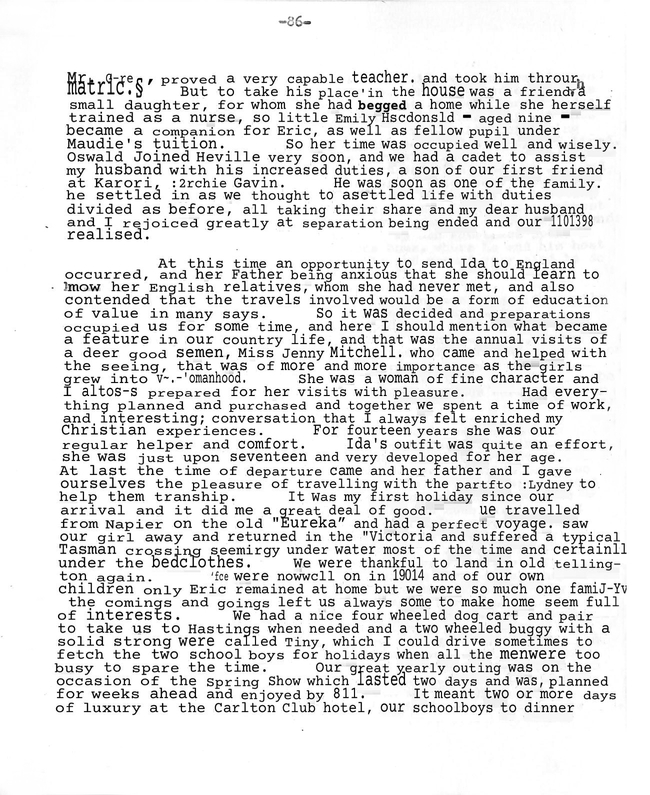
-87-
(where the waiter used to look elsewhere if nuts and raisins and such disappeared). In fact, apart from the great event of a trip the Show itself was full of interest to every Farmer and a gathering place for friends and acquaintances who only met once a year, and general picnic ground. The feeling of having a break, full of interests, did us all good and a happy, if tired, family went home and took up life’s routine again. We all had our individual hobbies, Aggie bred canaries, and had a stand of crimson geraniums in a verandah corner which were interests to all. She also performed prodigies in the way of knitting quilts which from their sheer weight and massiveness were almost impossible to lift and most certainly to wash. We had friends to visit and neighbours to meet. My man sometimes spent a wet weekend at Gwavas, the Carlyons home, where he and his host walked miles round the Billiard table and seemed very glad to do it. Life moved on.
In 1905 Raby finished her nursing training brilliantly coming second to top in New Zealand in her examination, but unfortunately in the doing had developed a bad knee, which threatened injury to the bones, and she returned to us, poor darling, with a limb encased in a plaster of Paris and instructions which kept her on her couch for a year. A brave spirit and patient care in time cured the trouble but it was long before she realised that she could use the knee and crutches were necessary for her to move round.
In 1906, her brothers, William and Tom, wrote and asked for their two sisters to return to South Africa and make a house for them, being in good positions and able to provide for them in comfort. Both Raby and Maud were anxious to do so and my husband and I agreed, knowing that it was an arrangement very fitting, for it meant their being united and so we were faced with a big and permanent break in the home circle; and when Willie (after a month with us which made us realise how much care and love our girls would receive) took them away with him we resigned ourselves to our loss. It was a sad parting, those dear girls had seemed our very own for fifteen years; if our rule had ever sat hardly on their lives they had never let us feel it. I should mention here that early in the same year Eric had become a boarder at Heretaunga and little Emily Macdonald joined her mother after a visit which had lasted for three years. Ida had also returned by the end of 1905 after an absence of almost two years, during which time she had spent five months in Italy with an Aunt and also visited other countries and generally had enjoyed a most interesting time. Neville had matriculated at the end of his school years and was now at home and as my husband’s health was poor he decided he must have the help of both sons so Oswald returned home to assist.

-88-
I regretted this very much, but was unable to alter matters, so we had all our family except Eric with us also Becky and my dear sister. When the Edwards had left Becky told me she felt restless and was anxious to take some more interesting work, which was quite natural as she was gifted in many ways and station life very circumscribed. So she left us in turn to find some other niche and after trying nursing for which she found no natural liking she finally settled on secretarial work and after studying typing etc. secured a suitable position in Wellington and was successfully launched. Just before she left we moved Eric to Nelson College. I took him there and left him with an anxious heart, my baby son. I returned to Wellington on the day before a disaster befell the same ferry boat, which was wrecked with an appalling loss of life off the Peninsula, but I only heard about it in Gisborne, where, with Aggie we were en route for Auckland for a holiday, chiefly on her account. It seems hard to believe that I had escaped this trouble by so close a margin, I had so enjoyed the voyage from Nelson as it took us through that wonderful French pass and we also were greeted by the famous Pelorus Jack who gambolled round our ship. (Now, alas the celebrated fish has disappeared, we fare, for good.)
1908. We had a return from the two girls after two years. The Edwards, Jeffrey and Eb, eldest of three, had decided to return to occupy their mother’s share of Zevenfontein and as we had no intention of leaving New Zealand, they eventually purchased a half interest and share in the property and the girls came back to us on a visit while some building was in progress. We had them for some months. To our great joy Raby was engaged to H. B. Ramsey, an Englishman, who had remained in South Africa after the war and taken a Government appointment and when the sisters returned in 1909, after staying some months with us, their wedding took place. This was the first year that Becky became engaged to A. J. Petherick, an accountant in Wellington, and returned home to prepare for her marriage. A welcome gift again from “The Aunts” enabling her to please her own taste in her trousseau. The wedding was in St. Matthews Church in Hastings and was a very pretty festive affair, the guests being entertained at the Carlton Club Hotel where we all stayed, and they left for a honeymoon on the Marlborough Sounds. The next year we had friends of South Africa years to visit us en route to Japan. They had been at our wedding and were now resident in England. It was a pleasant renewal of an old friendship. They had planned a trip up the Wanganui River ending at Rotorua and Taupo and insisted on playing host to Ida and myself. Their young daughter, Nora, making a happy fourth. We had a fine trip, though the drought had lessened the flow in the river and our boat only reached Pipiriki where there was a fine hotel and we struck the
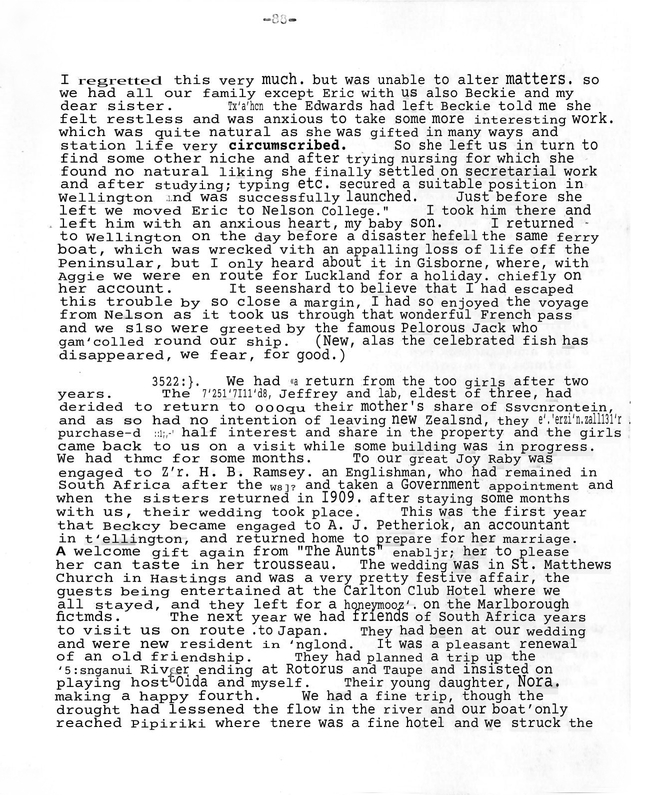
-89-
railway head at Wairoa when we took coach again over the wild National Park, in which the smoking volcanic mountains of Ruapehu reared their snowy heads. Barren, sandy country with scrub and fern and a bare track made the journey rough and we were glad to arrive at Tokaanu, the village at the head of Lake Taupo where the launch met us and took us across its 22 miles. Wairakei was our goal and we had a happy sight-seeing time seeing the geysers and the Thermal activities in full play, Champagne pool and dragons mouth; in fact the unusual was everywhere. I specially was impressed by the Blow Hole, when hidden forces of an immeasurable power roar again, night and day; it is called the safety valve of New Zealand, and probably if choked, would indeed cause a disaster of intense magnitude. All things come to an end and here we parted, our friends to continue their trip to Japan to see the Cherry Festival and Ida and I by coach and four over the mountains to Hawke’s Bay, a trip which took two and a half days with that way of travelling, Cobb & Co. Coach and four horses were changed at intervals. Our first stop for lunch and change of animals was at Rangitaiki and by night we were amongst the mountains and stayed at the Tarawera Hotel. The climbing soon became very arduous and Turangakuma was a slow task, but the views of rolling mountains as we mounted was superb and awe-inspiring and when we reached the summit a panorama extended far and wide. Then came the Nuhaka [Mohaka] river fortunately bridged and from there another climb, very steep in those days, (since then much improved), where the men had to walk the horses. Once over the pass on the Ruahine [Kaweka] Range it was a gentle descent, though with many ups and downs. Another halt for the night at Te Pohue, a comfortable roadside hostel and early afternoon found us in Napier with the sea sparkling and my man welcoming us with a great surprise in store. A Car, actually a motor car! bought second hand from our Doctor who was leaving for a trip home, a Humber. Feeling very important and going very carefully we went off in our treasure. All her little ways had to be learnt and believe me she had many, and they tried us often. The first was when we faced our last home hill with a length of grade of one in three when we found her absolutely refusing to budge, much less climb, and once again we got out and pushed and wondered if it was our fault or hers. My man developed a love for cars, and especially their insides, positively abnormal. He slept with a pile of text books beside him, ready to study them at the moment of waking, and what he did not learn was hard to say, but the fact remained that the lady was old and had worked hard and had many tricks so she gave work as well as service; in fact, when eventually she passed on to fresh owners I think we decided that Humbers were not a faultless make. That year seems to have been full of experiences. One particularly joyful was a long visit from

-90-
two of my husband’s sisters Emily B [Batley]. and Louisa R [Rae]. They had long talked of coming and now the trip was an accomplished fact we tried to show them to all our friends and our kind of life and surroundings with its new ways. They were fond of walking and Louisa especially was sometimes up and over the hills to breakfast with Neville who was now trying sheep farming on his own, having rented the old and first bit of Glenlyon with its cottage from his father after having had some outside training at Te Apiti Station and also in Gisborne, about three miles across the grassy hills and he and his Aunt, who were great friends, enjoyed their many visits and talks. The sisters had landed at Dunedin and saw the South Island before visiting us and enjoyed it greatly, so that they had quite a knowledge of New Zealand before they left. We missed them badly when they finally left with their many interests, but they made my husband promise to repay their visit soon.
In 1911 Oswald reached 21 years and we had quite a party of young folk to celebrate. Entertainments were not frequent because of distances but they had their Tennis Saturday and they managed to see a good deal of each other and life had many interests for them. In 1912 my husband visited Europe as arranged, landing at Naples in April and staying with the Raes and after travelling round visiting Rome etc., went on to England. His diary has a full daily description of his trip until it stops suddenly in the Red Sea when he unfortunately fell ill of Bronchial asthma which attack undid a great deal of the travel benefit of his trip, and when I met him in Wellington he was far from well and had to be careful, in fact, I date a definitely delicate condition from then on. In 1913 while he was absent I saw a property at Havelock, a bare hill top belonging to friends, the Quartleys, with whom I spent a few days. A beautiful site and the thought of acquiring it became an obsession. My sister had developed a definite neurostathic [?] condition. I now required a nurse companion, which after changes, settled on an elderly lady who was all we wished, but her condition could not be treated properly so far from frequent medical attention and she was settled in rooms in Napier where I frequently visited her until the end took place in July 1915. She was a most devoted sister, one of the meek who are promised the earth as an inheritance. Her life was spent for others. Our young folk, only our own now, had their lives before them. Young men. Neville had drawn a section of land, part of the Sherenden estate and already taken possession (in 1913 Oswald, his Father’s right hand had Eric as a young assistant) Ida our only stay and help was very tied. My husband developed a very weak heart and altogether found the station work far too much for him so I brought forth my schemes and after a while they found favour and it was decided to spend
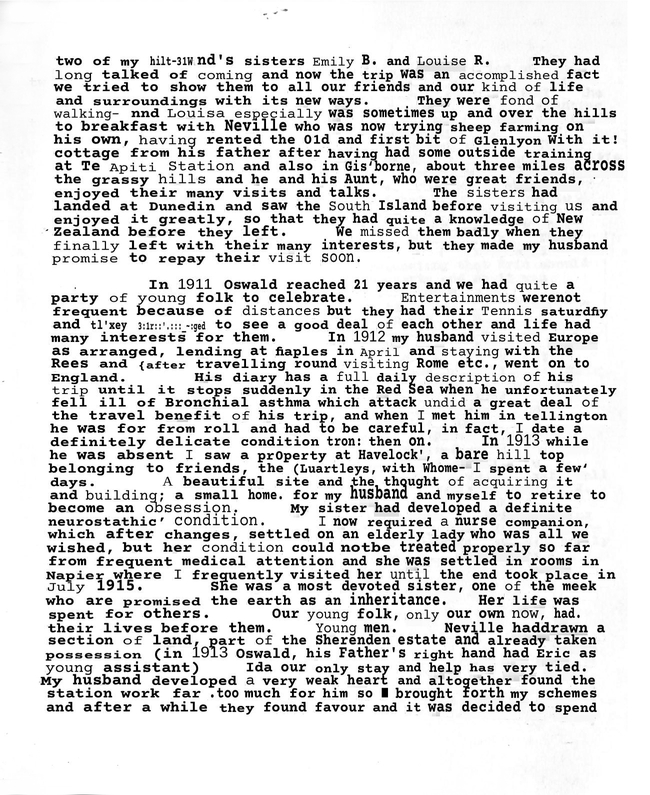
-91-
all the moneys belonging to me that had been invested and used by the Glenlyon property including a legacy that had been left me by my Uncle and Godfather, Nelson Cherer, of £1400 to buy the section in Havelock North and build a house. In the meantime I planned the building I wished for and it was eighteen months in doing. Having secured the section, the question of building arose. The war, of course, which startled the World by its sudden outbreak in 1914, made all business propositions difficult, and had it not been for the threatening of utterly inadequate health, I often wonder if we would ever have been able to carry out our plans but Oswald had become engaged to M. E. McLean of Gisborne and as a home would be necessary for him it was considered best to continue our arrangements and by the 9th October 1915 we moved to our present home. The war had been over a year in operation. Neville, aged twentysix left early in 1915 after requesting that Eric should be lent him to carry on at this own property and so it was settled, no one supposing that four long years would pass before our soldier boys could return again and meanwhile those left to carry on the producing labour of the Country as Oswald was doing would eventually have to go also. He was married on October 5th 1915, so that year was marked by that event (the first wedding in the family), Aggie’s death and our move to Havelock North, which brings to an end another chapter in our lives. 1898 saw us arrive in New Zealand on October 9th, of the family group who landed comprising E.C.C., myself, Sister Agnes Coleman, nieces, and nephews Raby, Maud, and Arthur Edwards, Becky Coleman (S.C.C.’s daughter) and four Clarkson children, Ida Neville, Oswald and Eric. By 1915 when my husband retired and we moved to Havelock North our daughter, Ida, alone was left to us. Agnes Coleman died in July 1915. The Edwards family had all returned to South Africa and Becky Coleman was married to A.J. Petherick and lived in Wellington, Neville was at the War, Oswald installed as Manager of Glenlyon Station, Eric carrying on in Neville’s absence from Glen Doone, my husband was suffering from “Angina” of the heart and his health precarious, really necessitating the resigning of all heavy and active work.

-92-
1915 October.
Life in our new home began under very disturbing conditions. The war was in its second year and all concerned were beginning to recognize the fact that its end was far ahead. It dominated all one’s plans, filled our minds, kept our hearts on the rack of anxiety, and our hands busy, limiting one’s spending and preventing developments of any kind. My husband had to endure ill health and anxieties which robbed him of a great deal of the benefit of his new freedom. He was now 61 years of age, or reached that age in November of the same year. I was often very anxious of the result of our move, but when he began to take up civic interests to which he gave himself whole heartedly, becoming a member of the Town Board (of which he was chairman for several years.) He resigned from the County Council considering it should be in the hands of resident country members, but by degrees sat on other Boards, Iona College being one, the H.B. Farmers of which he was a Director etc. He was also instrumental in organizing the Havelock North Bowling Club, of which he was a member and adherent for many years. It was always a great pleasure to him and his memory is still fragrant, they tell me, amongst his old and fellow members. These occupations etc. became, in time, of great interest and his health gradually improved and I was very happy when he once said it had been a very wise move for us all in every way. Only then did I feel that I had been justified in suggesting the persuading him to make it. The war continued its weary length and by degrees drew all within its net. The time came when Oswald had to go, another upheaval. A manager, Mr. Powdrell, was secured to take his place – and his wife decided to make a home with her Mother at Glencoe. During his time of camp life and training most of her time was spent in an Hotel in Featherston where I also spent a short period to see something of my son before he left. In camp with him was Clement Wilson, Ida’s fiancé, and when they finally left, our goodbyes were said there, as our men disliked the idea of a lasting [last] parting in public (and we fully agreed) adding tragedy to tragedy. On our return home Meta went to Glencoe to her old home and Mother. We all had anxieties to endure and tried to occupy our time by working for the Red Cross and similar activities. Arthur Edwards returned to New Zealand to join up with our Forces. His two brothers were already in France, also Captain Ramsey and Maud was helping Raby with her two baby sons. Arthur’s health, never very good, gave way at the front, and he came home a sick man like many others but we can never forget the great and solemn fact that as our members numbered three of our own family and four nephews and every came home to us without lasting injury. We have much to thank God for. The war continued to dominate all other activities. We lived for mails. Neville arriving in Egypt just before evacuation of Dardanelles was soon in France and the Somme offensive, in fact through every

-92- [duplicate number]
phase of the war in France until being severely wounded at Passchendaele. His injuries caused shrapnel wounds in thigh, arm, scalp, but mercifully no bones broken and he was on a Hospital ship for England within twelve hours. There he remained until March of 1918, when, cutting his convalescent leave short he returned to France and rejoined his unit. He was also studying for a commission in the artillery, which branch of the services he had been in from the first, passing finally while still on the field early in October of the same year, and returning to England where he was told to await orders before leaving for Exeter training depot for officers. During this delay the Armistice was signed and as he was anxious to return to New Zealand he accepted his early release. The abrupt termination of the Great War as represented by the Armistice, accompanied as it was by the epidemic was almost a blow to us in New Zealand. Oswald was still in Palestine and finally delayed in Egypt and with many other men of the New Zealand forces did not return home until later in 1919. C. H. Wilson had contracted malaria badly in Palestine and was returned home in a critical state of health, though much improved by the voyage. We in New Zealand had our share of the world wide horror of the epidemic that spread everywhere just when the black shadow of actual warfare was lifted. Armistice Day, when we all rushed to Hastings to join in the general rejoicing we were faced by the news of this new disaster, which beginning in Auckland spread rapidly through the country. The Mayor, in addressing the crowds, stated that it was as a “Black Plague” as fell in its effects and as sudden. To try and stem the infection all kinds of restrictions and injunctions were instituted but already, had we but known it, the dread pest was in our midst brought by those flying from elsewhere with the infection already upon them, and before many hours were over all were engaged in fighting a foe in our midst. My husband as chairman of the Havelock Town Board, received the Government instruction to prohibit public gatherings etc. and carried out a difficult task with the help of the citizens who in general recognized the necessity for the drastic measures imposed. In Hastings the Race Course with its buildings became a hastily improvised hospital and volunteers called to nurse. Ida decided to go and was fortunately an assistant to Sister Anderson of Poporangi Station, an old friend, then in charge of the night work and she took care of the nurses as well as patients. She carried on while able, returning very tired out but safe.
Christmas saw us having a necessary holiday in Timaru which we found a lovely spot, and with the anxieties of the war and the epidemic behind us we thankfully enjoyed the time we spent there, all benefitting to a great extent. C.H. Wilson was with us and when we returned home it was to know that Neville was on his way back, among the first shipload of fit men.
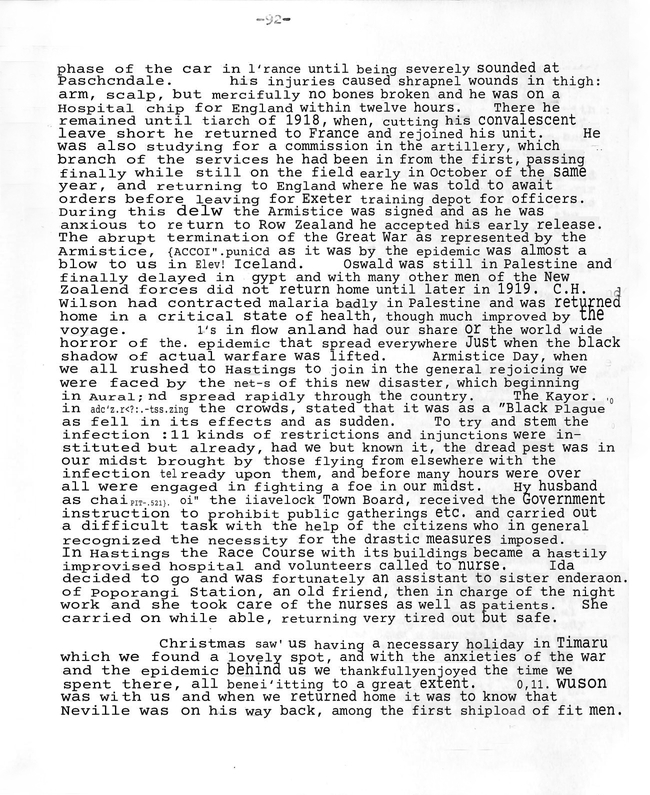
-93-
The “Hororata” steamed into Wellington on the 13th March 1919, Neville’s thirtieth birthday. His Father and I were there to welcome him home, looking strong and well, a very happy occasion for many parents. Next day saw us back home with flags and banners flying in welcome. On the thirtieth of the same month he married Miss Ruth Waterhouse to whom he had been engaged for the four years of his absence, leasing an empty house while building his own. All these events were full of interest to us all. It was also decided that Ida and C.H. Wilson should be married in June of the same year and our energies were focussed again on another wedding, being our one and only daughter, added to our many preparations. On the 18th June she left us and as C.H. Wilson was now manager of a sheep run in the Whakatane district we felt it was a big break. In fact, after forty years of married life my husband and I were again alone, with our children living their own lives, and this year Eric purchased a small holding at Onga Onga when Neville came back. Oswald came back later in the year having been delayed with the Army of occupation in Egypt and we were now the most thankful of families, reunited and in full hopes that the sad sufferings of the past years would never recur.
We paid our first visit to Ida in November going by sea to Gisborne and through the glorious native bush through Opotiki. The Urewera river ran past the Homestead that native reserve as a hinterland belonging to Chief Rua and clan. Returning via Rotorua we again had to part with our girl but always with the hope that other meetings were in store, which hopes have been fulfilled many times in the years that have passed.
I had to find some outside interests and joined the Hastings Community Club, which with its many activities at that time really represented the only institution of its kind, Women’s Institutes and Guilds came later, and by degrees absorbed the country as well as the town. Having a small subscription they of course attracted a great many members, and in time, have become here, as elsewhere, a great source of interest and pleasure to those who were unable to reach town easily or town residents who were also unable to pay a larger sub which was necessitated by the upkeep of permanent social premises etc. The Club, as its name indicated, was ready to help in every good work for the town’s benefit, and entertained visitors to the town. Its circles devoted themselves to specializing in subjects as Art and literature, music etc. and I think that though there are many other attractions for women in Hastings today, the Community Club still carries on and does its share for the social and useful needs of the town. In time membership entailed work on Committees etc. and as we
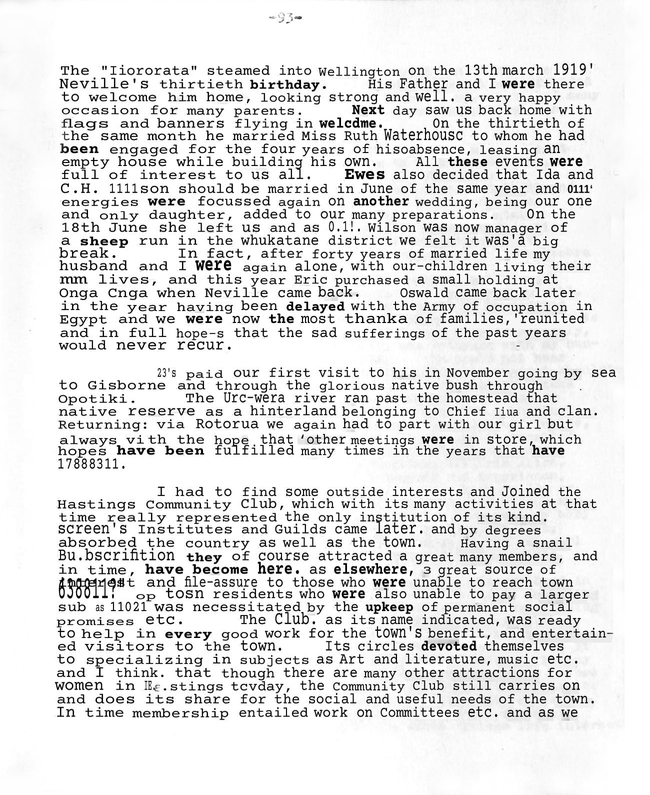
-94-
added to our duties our interest developed, and I for one, have to thank the Club for the pleasure it has always afforded me and the kindly friendships which have ensued. We had many friends and the neighbours around us whose daily lives were knitted with our own.
And so time passed, and 1920 brought us our first grandchild, when a daughter was born to Ruth and Neville. She was welcomed here in our home on the 7th [12th] February, the first of a second generation, always a source of delight and interest. She was later christened May. She was followed in a year’s time by a brother. Unfortunately Neville met with a serious accident just a week before his birth. Coming home late he took a wrong track on the cliff edge and fell some distance crushing two of his vertebra (as X Rays showed later.) How he ever crawled up the bank, released the horse from the cart and reached his home with only the aid of a shovel, will always be a mystery to us all. Sheer desperation, fear of his wife’s anxiety if he did not return, aided by an indomitable spirit alone did it. When we heard on the telephone his father and I went over immediately, and fearing the consequences to Ruth, she returned with my husband and I remained to nurse Neville. He would not hear of being moved, and the Doctor said he could only suggest absolute rest. In three weeks time he was on his feet using sticks and making light of the injury, but from that hour and for years he slept on boards, and life must have been a burden. Meanwhile his son was born in April, a great big boned fellow giving promise of the 6’ 2” he has grown to, and they called him David Cooke, the latter his grandfather’s second name. The Oswalds gave us another granddaughter, Marjorie Alice, and we felt a big family, full of interests and importance, to be increased the next year, when a son was born to Ida on 4th July also in her old home, wee Derek John, and mother and babe were with us for some months, so he was very much my baby as well as my delight. How I revelled in his sweet ways. The C.H. Wilsons were changing homes, and so we had our girl back for a while until they were established in Dannevirke.
In this year the last of my father’s sisters died in England and I inherited my share of the family estate amounting to the sum of £5800, a very great comfort to us in our oncoming old age. I was able to give a nice present to my four children, and the remainder when invested, has given one a personal income which added to our security in many ways. It also involved a good deal of a new type of work for me, but my husband educated me up to it and helped me in every way. Some years later this amount was increased by another £2000 from the same source through the death of a cousin which the current discount added to, thus increasing my Income which since my dear husband’s death together with the South African life interest

-95-
from my father’s estate has enabled me to continue to live in simple comfort in our home without any disruption.
In 1923 we had a visit from my husband’s sister and brother-in-law, Mr and Mrs C. Rae of Naples. They had visited Australia first where their son Leonard was sheep farming, and their youngest son, Francis, was travelling with them. Mr. and Mrs. Rae planned a visit to China and Japan, leaving in April, and wished to see something of the South Island first, so we took a trip in our car, now a “Cleveland” and good for hill climbing. We left L.R. Rae with Ida, stayed a night in Wellington and shipped the car to Lyttelton when we crossed ourselves. We had lovely weather – March, stayed at Christchurch a couple of days, went to Timaru for a night and then on to Mount Cook, where we saw the Southern Alps in their beauty. Francis joined the sight-seeing and climbing parties and we elders enjoyed the fine hotel and quieter pleasures. After a week there (where C.R. was delighted to find real Chianti) we left for Queenstown via Central Otago, sleeping the night at Lindis Pass, that ghastly spot where the hills surface looked like the ancient hide of some enormous stuffed animal, due they told us to burning the pasture at the wrong season to destroy rabbits. The Accommodation House was of a very dreary type, and Francis declared that he was smothered in face powder when he hit his pillow that night, evidently left by the last occupant of the bed. We drove through deserted sites of gold diggers in every state of dilapidation and decay, and climbed to the top of the Crown Range. It was a marvellous view – sheer drops, dry hill-sides, very steep and nerve wracking, long winding descent. We reached Queenstown at sundown and stayed a few days. We went by boat to Paradise. Heavy rain prevented us from seeing anything. We were in a closed in bus and the rain kept up all day. The Lake was very long and beautiful and also the Mountain Ranges called the Remarkables. We left for Dunedin via Central Otago, good fruit growing district owing to irrigation, drove through Cromwell, reached Dunedin late and only stayed there one day, returning to Christchurch halting near Palmerston South to see prize stud farm. We left Christchurch by train for Arthurs Pass and railed the car owing to flooded river, went through the Otira Gorge, very fine bush lined road and reached the Bush Inn at the foot of the Routes, and stayed the weekend there. It was very primitive, but very comfortable. Thick feather beds and crochet everywhere, a large iron fireplace holding huge logs and the food was excellent – trout from the stream at the door. There was bush growth everywhere and enormous blackberry bushes, man high, ran wild. We left on the Monday in the rain, through the bush to Hokitika, which we found to be a very ugly town on a shingle beach. Iron roofs, dull red with met[?]. It

-96-
was an old centre of Westland Mining Industries now much reduced in output and population, dull empty and dreary. We had intended visiting Franz Joseph Glacier, but were advised against going, owing to swollen rivers etc. and we left, going up the West Coast to Nelson. It was lovely country with rushing streams, heavy growth in grass and trees. We reached Nelson late, and found it full of visitors for Easter Holidays. There was difficulty in getting accommodation, and we fortunately succeeded in getting ourselves and car on the boat, leaving the same night for Wellington. We had to hurry owing to C.R. and F.R. having to catch boat leaving Auckland for Sydney en route for China and Japan (taking Eric with them.) I caught the next morning’s train and went to Ida, waiting for the party to come on later, L.R. was waiting for us at home and remained with us until her men folk returned in June when she and E.C. joined them at Suva, Fiji to travel round the Islands, Samoa, Viva etc. F.R. had gone back to Italy via Honolulu and America. Eric continued direct to New Zealand. Our kind sister and brother-in-law were very insistent that we should visit Italy travelling with them, and remain there until weather was suitable for England, and as their guests for this trip. A most delightful and kind offer. I was able to fulfil my life long ambition which was to travel, and especially to visit the Homeland. My life insurance had recently become due, thus producing spare cash to be used for this purpose, and having let the house to trustworthy friends for a year, we left New Zealand in December 1923 and spent a week or more in Sydney in Macquarie Street, and though the heat was excessive, enjoyed the first part of our trip intensely. The Raes met us there with their daughter-in-law and two young children who were travelling with them en route to England, and we all left Sydney on the fine ship the “Ormonde” then a new addition to the Orient Line, all very glad of the cool sea breezes. Melbourne and Adelaide were Ports of Call, but it was too hot to enjoy them, especially the latter.
Preparations for Christmas on board were very elaborate but something upset me and I was obliged to remain in bed on a diet of water and arrowroot for a few days, in fact when we reached Fremantle I was still afraid to risk heat and weariness and was left quietly on a deserted ship. We had a fine voyage full of pleasure. Friends from Havelock North were on board and added to our enjoyment. My husband spent his time in deck games, being always very active. I being one of a party found much to interest me. My husband and I, neither of us young. chose rather to be careful in our amusements and habits. He was now 69 and I 66, and able to discriminate in our activities.
We landed in Naples on the 23rd January 1924, where we
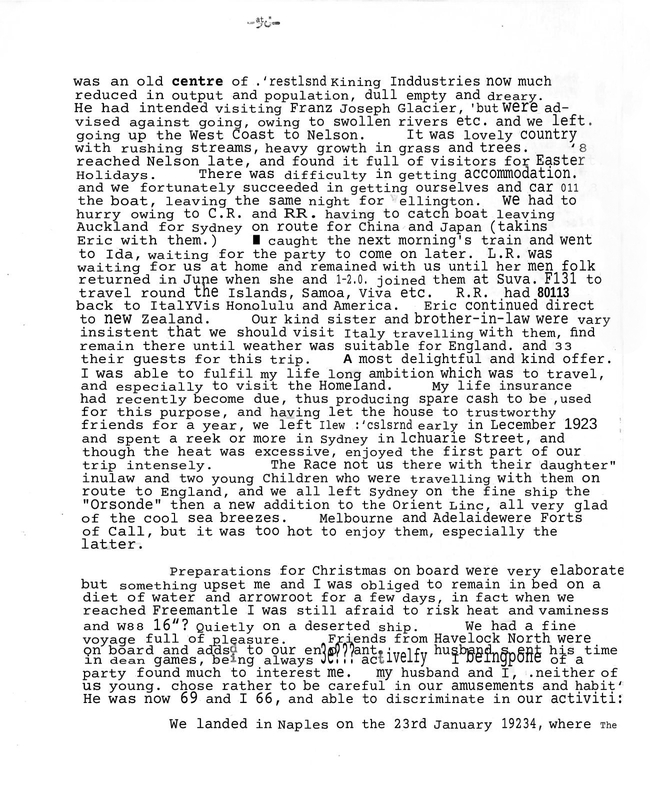
-97-
became the guests of H. and M. Rae, while the C. Raes adjusted their own home after a long absence. This beautiful villa situated on the Castle Hill was called “Casa Mia” and gave a most wonderful view of the Bay and the vast city, and our loving and attentive nephew and niece gave us every opportunity of seeing everything possible. Driving about in their Fiat car and in their lovely home we had a very happy time. Unfortunately our host developed ‘flu, and E.C. also. A doctor from the International Hospital prescribed cold water packs, and I saw this wonderful treatment applied first by hand by the very capable housekeeper, an Australian, who told me she had often done it before. Firstly the big linen sheets were wrung out in cold water and the patient entirely enveloped in them and then came blankets. This was repeated until the temperature was lowered, and as in our case, the patient no longer required the treatment. We were very grateful and as soon as possible E.C. and his brother went to Capri to recuperate. The climate of Southern Italy is very trying in the short Winter. Fire-places are considered unnecessary at “Casa Mia”, marble floors and glass doors were covered by thick carpets and heavy curtains which counteracted these disadvantages, but in Summer I was told, every vestige of such furnishing would vanish and the great aim would be towards keeping down the temperature. So the well-to-do could face it. The poorer people must have been glad when they could open up their one or two roomed houses in tenement buildings. I happened to pass one which must have been rarely ventilated and just opened up, and was glad to hurry by and escape the odours. Our friends at Parker’s Hotel had also suffered from the flu, and when all were better we went together to Capri to recuperate – a lovely spot. We stayed at the Hotel Tiberio, quite a party of us, and found it full of German tourists, the first batch of our late antagonists since the War, travelling on a coupon system which included even waiter’s tips and was not appreciated. They kept much to themselves though we saw them everywhere. Capri was delightful and we enjoyed our ten days very much walking and sight-seeing. A gay happy party we visited the Blue Grotto studios etc. met artist friends of C.R.’s and had a water colour by H. Fisher given me.
On our return my husband and I went on our own to Rome, staying for a week at a nice Hotel much favoured by English people. We had first tried the “Princes” near Trinita Steps, but Americans there demanded such a degree of central heating we found it overpowering. The “Angleterra” was much more to our liking. Speaking of the Steps of “La Trinita”, they remain a beauty spot in my mind. Always crowded with flower sellers with masses of brilliant hued blossoms, carnations especially. We visited the usual places of interest, St. Peters and the Vatican were dwarfed to my mind by the building which crowded

-98-
round them. I understand Mussolini altered all this and it would improve their proportions. We also thought the interior of the Church overfull of statues etc. In fact of all the many Churches we visited in Rome, only one remains in my memory as being beautiful and that was St. Clements. The wonderful interior of pure marble with its perfect proportions and sense of simplicity and purity stood out among all others. I have just read H.V. Morton’s description of it in his book “Lands of the Bible” and am glad to find that his opinion agrees exactly with ours, and he depicts the Church as quite the best and most interesting. He also mentions the underground newly excavated original home of St. Clements which we also visited, the Irish Priest who guided us remarking that probably within those small rooms Peter and Paul had discussed their missionary journey with their friend, the first Bishop of Rome. We also went down to lower excavations ending in a Temple of Mithras complete with its altar. Rome of course was full of churches, but while wonderful buildings, the interiors were too ornate for our simple tastes. The ruins of the Forum and the Catacombs were of the greatest interest. The Colosseum, a place to avoid, in fact, the City’s history clouds its beauties to such a degree that I was not even tempted to drop a coin in to the Trevi Fountain, which promises a return visit. From Rome we went to Florence, where it rained solidly during the four days of our stay, and we were glad that so many of its beauties are under cover. Its picture galleries etc. especially. Not being an artistic expert, I am afraid I walked through many galleries of treasures that did not appeal. Rooms of Holy Familys, of which I bring away Murillos alone with Joy. Rooms filled with martyrs and their sufferings in every form. The Baptistry or Cathedral remains a colossal wonder all its own, especially its marvellous doors. I think I remember with most pleasure the Monastery of St. Mark where Savonarola lived and from where he taught. His simple garments threadbare and like gossamer lie under glass. The place speaks of peace with its cloisters, the library with its illuminated missals, the music for their choir singing on the racks. How they ever knew what to do with notes apparently of one value and those minims, made square not round, I cannot imagine. Around that spot is peace; not so in the coloured marble splendour of the Tomb of the Medici Family, too variegated. The spot where the Saint Savonarola was martyred is marked in the square. No one wanted to be shown the “Narrow way”.
Then Venice, and again rain – a bit too much everywhere. We stayed near St. Mark’s Square, and saw the sights so well described by so many. The Doges Palace with its colossal rooms, painted walls and ceilings, which required one to lie on one’s back and look through glasses to focus them. The
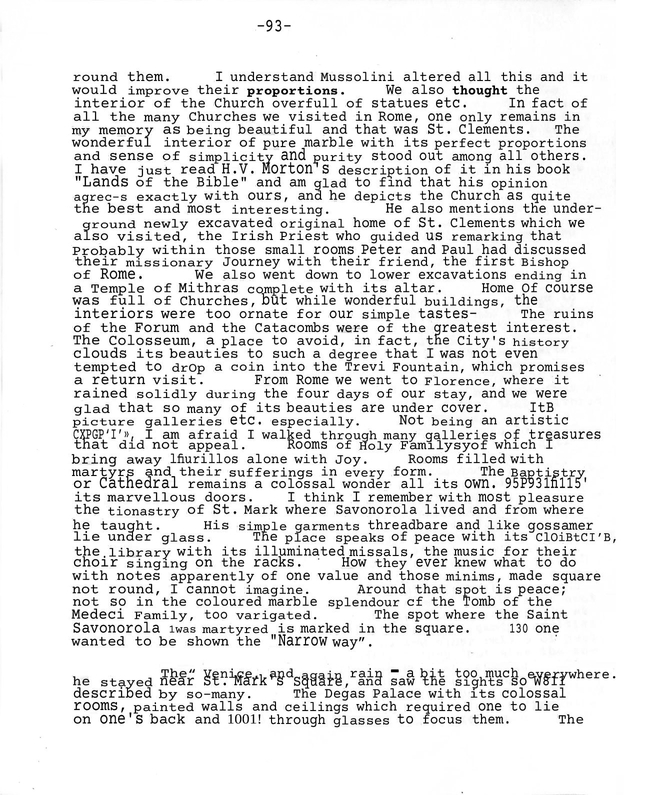
-99-
Bridge of Sighs, the hole in the wall where anonymous accusations could be posted and bring one’s enemy to his doom. The beauties of these old places are so saturated with suffering and villainy that it is hard to enjoy them. One just accepts them with a feeling of thankfulness that their influence is no longer quite so active. Now after twenty years as I am writing this, and the world is being shattered again, one wonders how much is due to the hand of God and how much to the children of Man.
It was beautiful to visit the modern art shops, glass, embroidery, and above all – lace. I saw a table cloth draped over a full sized table clothing it to the ground, most of most exquisite filet lace and from two ladies discussing its price at my elbow, I heard its price – 800 dollars, “and I’ve bought it”, said one.
Back to Naples to prepare for our further voyage to England, where we landed on April 21st in 1924, and the feeling of pleasure at arriving at Tilbury, seeing kindly English faces, hearing their voices and sensing their friendliness, comes back to my memory with pleasure and a sense of security even after so many years. Spring in England! From our Hotel we could see Kensington Park and I shall never forget the sight of budding elms with their exquisite foliage breaking forth from a net work of black wings in tiny lettuce green fans that quivered against the pale mauve atmosphere over London town. Green grass, pale blue skies, a dream city floating in a delicacy of colour that made a fairy land and thrilled one with delight.
And then followed a delightful time amongst relatives and friends we visited. New sights and old associations. “Northe Bank”, Muswell Hill, the old home of Uncle F. Cooke, now owing to Sam Cooke’s death (eldest son) being used as a convalescent home, where Jessie Williams (nee Cooke) was breaking up the old place. Then to the Colarts (Norah Biddle) near Portsmouth, from where we visited Winchester, the Queen of Antiquities, filled with the romance of the past. Had lunch at “Ye Olde House of God Begot” given by Edward the Confessor to his wife. We visited St. Cross and sampled the dole and trod the sacred floors of the vast cathedral. Then we went to Colchester to my folk. We stayed with the Stannards at Eaglehurst at old Clacktown and revelled in the quaint oddities to be found in bottle end window panes and other relics of past days. I again visited St. Osyth’s Priory, but alas the so-called restoration has robbed the Church of all its antiquities Especially did I grieve over the Fold for Communicants that I have mentioned before as standing in the Church. The spiral stair to the Penitents chamber was now blocked, and prim chairs replaced the curtained pews; in fact its ancient charm was gone.

-100-
We saw many relics of the family of Coleman, often only tombstones, but they covered our forebears. At Lexdon I saw the entry of my grandparents wedding in April 1815. James Coleman and Harriet Hayward and the remains of the Church house, her girlhood home. After a lovely time when they were very good to us, we left for the West County going from Colchester to Tewkesbury in Wiltshire. Travelling through, I first saw K. Alfred’s white horse against the green hills. Here Ronald Taylor met us, and after a couple of days we with Ronald and his wife Olive, left for a motor trip in a high powered Buick. Only once was the hood raised in two weeks which describes the weather which favoured us. Olive and I sat behind and I was glad of a tied on hat and my Rabbit coat for Ron drove like Jehu – furiously, and one needed anchoring. What a trip it was! Through Wiltshire to Somerset, a glimpse at the Cathedral and the Commanderie with its associations of Charles in defeat. We reached Wales by night, and stayed at the Devils Bridge Hotel or Inn, I forget which, but remembered that my Mother in 1852 on a similar tour (only with carriage and pair) had stayed a night. I mentioned the fact and Ronald got the landlord to look up his visitors Book of that year, and there was my dear Mother’s signature in April 1852 – Mrs. W.H. Coleman, South Africa. It gave me a great thrill. From here it was through Wales with its slate quarries, roaring streams and wild country past Conway (also in her itinerary) to where we stayed the night. Next to Chester, the medieval beauty spot with its rows of black and white upper stories and complete well. From there we went through a bit of the black [back?] country. On again the next day as far as the Lakes en route to Scotland. Through Carlisle, we arrived too late at Abbotsford to see much, and had to hurry to Edinburgh and try for accommodation. These flying men on wheels are too hurried for my liking. Ronald had planned a tour and stuck to the timetable. Many a time I would have lingered, but had to press on. We found a vast empty hotel, and the landlord did not seem at all pleased to see us and told us flatly that there was no chance of food, but directed us to a railway restaurant where we fortunately got a meal and were glad of bed. After breakfast next day we took a walk up Princess Street, which shows us the best of the town. Holyrood was still surrounded by ugly squalid buildings. The Castle crowned the hill and the tomb of a faithful dog asked for sympathy. Then away to our objective – Pitlochry, through an interesting country. I remember especially the road beside Lake Rannoch, that long narrow sheet of water, coming out upon the heather clad hills and breaking our fast with a real Scotch high tea as immortalised by H.V. Morton. In Pitlochry we stayed a few days at a good hotel especially favoured by fishermen and our men went off to try their luck. My husband was a silent member when on their return they showed the result of the day’s sport (7) – handful of wee fish that in New Zealand would not have left the hatchery. Ronald would have them for
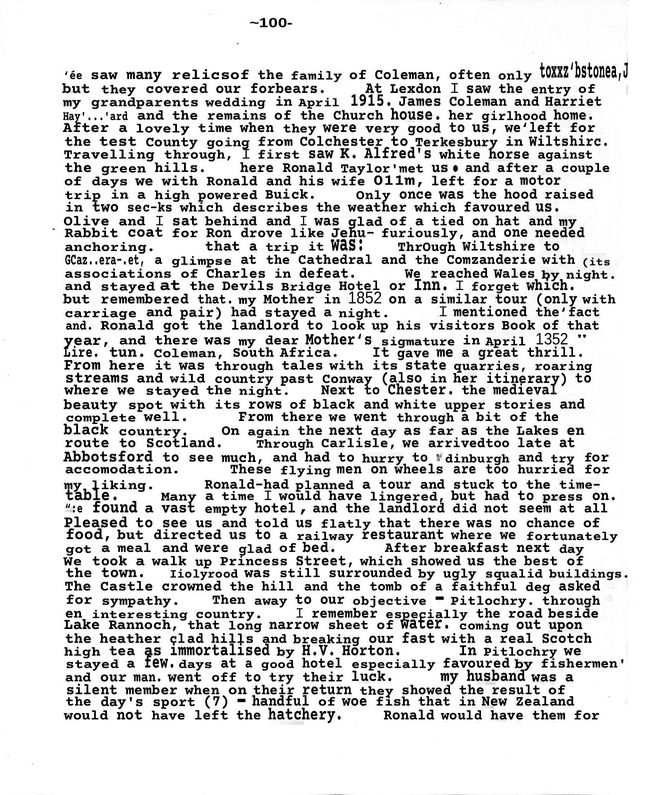
-101-
breakfast and professed to enjoy the dried up chips. We went to see the salmon leap at Blair Athol a great sight, though it was rather early. Pitlochry produces hand made woollens, but I was not buying. From here we crossed Scotland by way of the Devil’s Elbow, past Braemar and Balmoral to Montrose, where Ronald had faming relatives and our men examined stall cattle etc. The one item I remember of this old town were the quaint wynds, or long narrow openings from the streets into cosy squares surrounded by dwellinghouses and little gardens, most unexpectedly green amidst the grey stones surrounding. The idea of these secluded dwellings was never obvious to me. In Keswicke one understood the narrow approaches were for easy defence, but surely not necessary here. We had a hurried drive to Aberdeen to visit a sick relative. I can’t say it was inspiring. The grey north sea rolled in all along our route, and Aberdeen stood grey and gloomy at the end. We waited in the Main Street while Ronald and his wife made their call and were glad to turn southward on our return Journey. Remembering that this was mid-June and wondering what colour the sea and land would show in mid-Winter. Our trip to Aberdeen had made us late for our arrival in Edinburgh, and when we reached the Ferry it was 9a.m. [9pm] (just sundown) and no chance of crossing that night, so we rushed off to Dunfermline to find it crowded by an influx of participants in a childrens fete next day. We got a ham and egg tea somewhere, but no where to lay our tired heads. We stopped to refill our tank at an outlying garage as we were leaving to find accommodation elsewhere. Here our tale of woe aroused great sympathy, and one workman thought he knew of a young couple who would oblige. This they kindly did to the very best of their ability, but the few remaining hours of darkness were sleepless owing to the nearness of a rail head, where continued shunting never ceased from shattering the silence and our nerves. However, we were very grateful and departed after a cup of tea and a plate of cold ham. Dunfermline was en fete in memory of their patron, Carnegie. We visited the ruined church in which the Bruces heart was once buried, and I would have liked to see more of the beautiful gardens, which are a feature of the town, but time was pressing. We had to bypass Edinburgh and we spent the next night at Alnmouth, where the Duke of Northumberland Castle is such a feature. Arriving too late to see over it, we listened to a eulogy (by the caretaker) of the Ducal family, who, according to him, were the salt of the earth. Lovely things to hear and beautiful things to ponder on, all feeding my love and pride in our Homeland. Our Ida had visited Alnmouth with Ronald’s family when she visited England and he had much to tell us of all they did while on holiday together. The next night saw us again at Oakwood House with Ella and Duncan and other family members who dropped in.
On again we went through Oxford where we visited the

-102-
Bodleian and looked passingly and hungrily upon the beauties of that Shrine of learning, and then to Stratford on Avon, where we stayed at the Red Inn, and snatched glimpses at what should have been lingered over – but whoever gets all they crave? These peeps of our precious places have been of priceless value to me ever since, and my life has been enriched greatly in every way by these brief contacts as I have always been a sentimentalist and I am ever thankful for them.
We reached home after our strenuous fortnight and took a look round the beautiful neighbourhood. Wiltshire is a lovely county with soft green pastures, and full of old world towns, all teeming with traditions and memories of an important past. We were thrilled at Devizes to see the notice of the woman’s instantaneous death when like Sapphira of the Bible, she swore to a lie and dropped dead. Bradford on Avon intrigued us by its Black Inn, where we had tea served in a very dingy careless manner in an historical building where ill-fated Monmouth spent his last free night before his fateful journey to London. A tragic painting of him hangs on the wall. We also visited the ancient Church of Saxon origin, lost for so many centuries until a Cleric discovered the roof line from a height, and investigation brought the place to light. How old it is no one knows. The angel in relief on the plasters walls is a poor attempt and points to a time in History when the Christian faith must have been in its infancy and also art.
These are only a few highlights of what we saw, my husband driving me around the lovely countryside whenever our host was too busy to do so. We visited Bath and admired it greatly. Then Ronald took us to Stonehenge, and finally to that Cradle of our Faith in Britain – Glastonbury. I was not the student of the past history of our Church and people that I have since become, but I remember my feelings of disgust that what should have been so sacrosanct should have been full of gaudy advertisements for cocoa etc. I speak of the surrounding township. Being Sunday, the usual English habit of locking up all Churches etc. on that day prevented us from seeing anything of the marvellous and mighty remains, except through barred gates. I felt dreadfully defrauded. Returning to Salisbury we had the same experience. The Cathedral was closed. That I could better understand as services might be interrupted, but Glastonbury! Oh, that should never be closed to worshippers in the spirit. Our visit over, we bid farewell and went down to Cornwall to visit my husband’s younger sister. What struck me most were the worked out mines with their deserted yawning mouths, surrounded by a low stone parapet, which my brother-in-law declared was necessary to limit the number of suicides. A heavy sense of poverty and want made me wonder why anyone should choose to live there. I don’t wonder saints
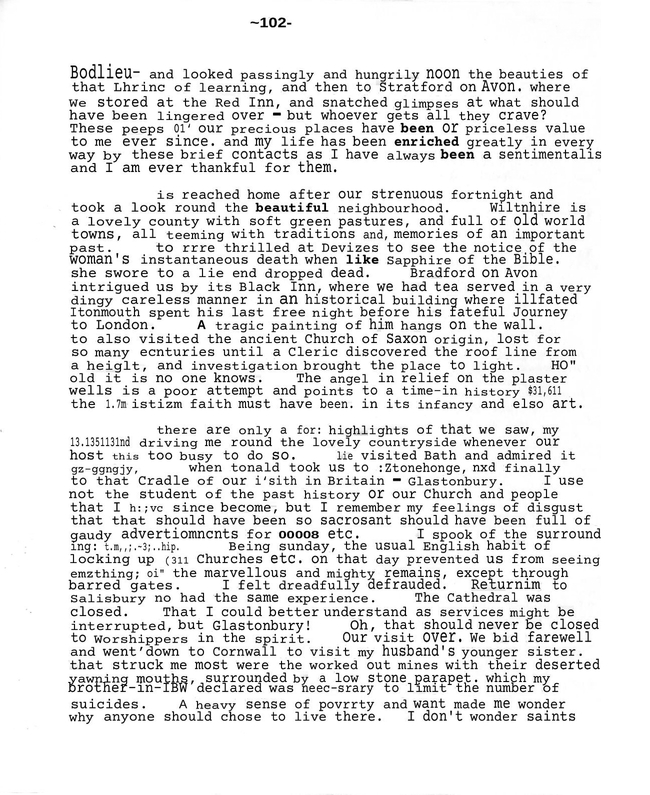
-103-
once abounded amidst its wild hills. No need to invent penances. They had chosen hardship for their lot and had it in abundance. I thought it a tragic corner of England.
From there we travelled to Yorkshire staying one night at Shrewsbury, which delighted me. The Ireland House and many others of the black and white period with their forest of small paned windows, the Severn winding through – such a delightful combination of the old and the new.
From there to Oakwood to Ella and Duncan, and the many kindly Yorkshire relatives who entertained us in their proverbially hospitable way. We went from one to another of their comfortable homes. It was a very happy time, especially for my husband to be amongst his own who were all devoted to him, and we were welcomed everywhere. There were changes to me, and many of the older generation had passed on since my last visit in 1884. We spent a very happy time with the Theo Taylors at Wharfdale, where they had built a new home away from business and factories. From there we visited Fountains Abbey and en route stopped at the ruins of Barden Towers where we saw genuine antiques in the home of a small farmer, who told me his forebears, yeomen all, had lived there for 700 years, original ancestors. “The Warden of the Gate” to the Towers responsible for all who entered. The roof had been repaired 400 years ago with huge beams of oak, in fact just shaped and showing the marks of the tools, hung from them were the Halberds used by the owner at Flodden Field. This descendant showed me his family treasures and said how collectors had offered fabulous prices for them. Blue and white china filled the oak shelves, a chair of Charles times, a table still older, and part of a black satin hand embroidered gown hung before the ancient fireplace. Stiff little bunches of red rosebuds worn by an ancestress. A feature of this quaint dwelling were bed-rooms built into the tower of the old Church which stood far below, now a ruin. This interesting man was a great lover of music and sang at the Leeds Festivals in the choir, no slight honour. He showed me his harmonium and the stacks of scores of the oratorios. He said he had lost his only son in babyhood, but had two fine daughters both away, one a teacher of physical culture, and the second his housekeeper, and when he dies there would be no successor to the name of Sylvester Lister, and that after 700 honourable years. Barden Towers and that fine Saxon yeoman will always remain a special memory of Wharfedale in Yorkshire. Another memory is one of an unusual almshouse for old servants. I think six each owned a room with cheerful stove and furniture for one. A general centre room used for Church services, and each person was the owner of a
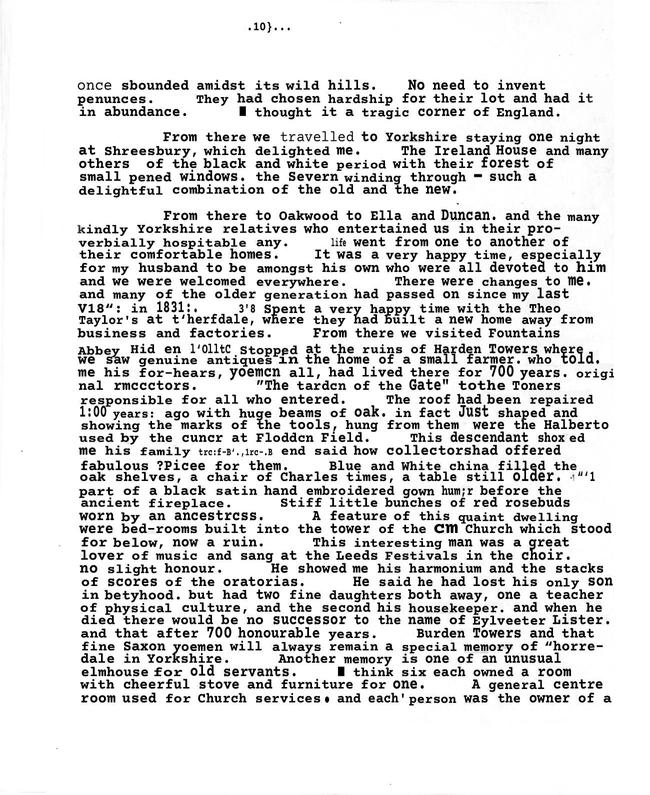
-104-
room, and they had a bit of a garden to cultivate. I believe this was supported by a Trust left by a certain Countess de Clifford and is still operating. Her memory is still green. We had endless drives and visits to places of such lasting interest, and beauty spots, which filled our days. The C. Raes from Naples were fellow guests with us and we were a very happy family ending with a garden party to celebrate our host’s birthday, a big family affair, such as old Yorkshire can produce.
From the “Romaine” we moved to other relatives and saw more of their busy lives. We left England on the 31st October 1924 the day after the Election that disposed of the Labour Government for the time being. The family group who saw us off had a trying time of it being ardent politicians. We left Liverpool in a dull drizzle on our way home via Cape Town where Maud and Raby with family met us and we stayed together at Kalk Bay for a happy six weeks before resuming our voyage in the Star liner “Runic” on New Year’s Eve. We had a very ugly voyage with only grey seas (the route takes one into cold latitudes) and there was no break. Unfortunately E.C. developed a serious attack of bronchial asthma which caused him acute suffering only relieved finally by a powder to smoke given by a kind fellow passenger. We reached Sydney to find a shipping strike in process which delayed us there for some days. We had word there by cable of the birth of Ida’s baby girl. The weather was extremely hot.
We reached New Zealand on February 7th, and our Morris Oxford car was waiting for us. We drove to Dannevirke to Ida and we found her there in the throes of packing for a move to Mr. M. Riddiford’s big station “Tora” on the East Coast to which her husband was appointed manager, and where, incidentally, after 20 years they still are, in the same capacity. The baby daughter was very fair and frail and was a great anxiety for a long time needing much care and attention. Her christening took place with us present and she was called Joan Blanche. Another son had also been added to Neville’s family the previous year and he was called Hugh Neville. We returned home to find all well. I took up my Club work again, as also did E.C., especially church duties. Belonging to the Havelock North Presbyterian Church he became an elder, and in turn took on the post of Secretary and Treasurer, continuing these duties until his death and fulfilling them faithfully.
1927 saw us happily welcoming a new daughter when our youngest son, Eric, married Kitty Downing, a young English lady who was very musical. While waiting she left her boarding house and made her home with us, so we learned to know each other well and became very attached to each other. As they were
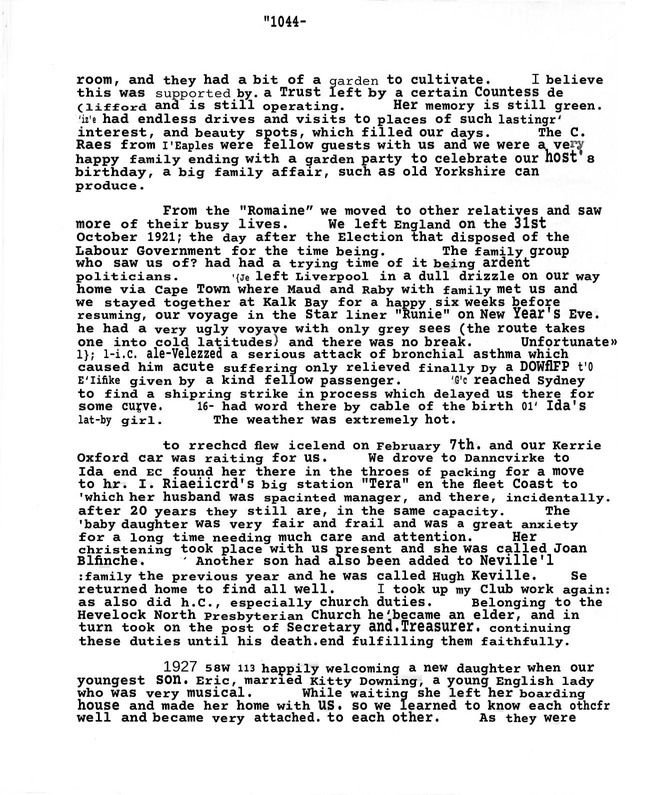
-105-
against building another permanent home at Glenlyon and a small cottage became available for hire about four miles via the Maraekakaho side, they rented it and made it as comfortable as possible pending other arrangements. They were married in the Havelock Parish Church in June. So now, with our last child married, there was a new home for us to visit. In the course of time, a dear little son arrived – another curly headed blue eyed Clarkson, something more for the enriched Grandparents to pet and play with. They called him Douglas.
Early in 1928 we had a cabled invitation to join Herbert and May Rae from Sydney (where they were visiting) as their guests, which we gladly accepted. We all stayed at the Wentworth Hotel, seeing many sights with them and enjoying being together again. We saw the first showing of talking pictures, went to the Blue Mountains, but unfortunately fog filled the valley and we missed the famed view. Another trip was to the National Park, which proved to be very interesting. We also visited Sydney’s suburbs, Rose Bay etc. and saw the wonderful zoo. We persuaded the Raes to return to New Zealand with us. Ida met us in Wellington and we had a few days together while they saw the sights. Then we returned home where they met all the other members of the family, and we had a very happy time together in our simple way of living. They visited Rotorua and finally ended at Tora Station where they had a good […] of […] on a large scale and a very good time from all accounts. They left there to return to Australia on their way back to Italy.
1929 was full of happenings affecting us as a family, and Neville’s life in particular. Midway in the year the home at Glen Doone was broken up through “incompatibility of temperament”, and before long, little Hugh, always delicate, sickened and died of diphtheria leaving a sadly afflicted father with a family of three to care for, the lady who had undertaken the task being unable to carry on owing to ill health. We had hoped for an elaborate celebration on the 15th October for the 50th Anniversary of our marriage and had made many preparations for the date when little Hugh’s death occurred, and altered our arrangements into a small gathering confined to immediate family and a few very near and dear friends, who all tried to make the day as happy as possible for us, but much was lacking with sadness and bereavement so close. The great world wide depression that started in May 1928 was beginning to affect all economic conditions and increased in intensity through its many ravages.
In 1927 we had a visit from a friend of Maud and Arthur Edwards from East Griqualand, their South African home – a Mr. Youroe [Young?], who interested me exceedingly on the amazing subject

-106-
of “The Lost Tribes of Israel” which he contended were really the racial origin of our British nation. Being convinced by his arguments which I found corroborated by the Bible itself in its prophetic claims for the restored and forgiven nation after its 2520 years of punishments etc. I sent to England to the Headquarters of the “British Israel World Federation for all the best of their literature, and on arrival, settled down to a full time study of the subject. (I think I should like to say here that a book called “The Destiny of the British Empire and United States of America” by “The Roadbuilder”, Colonel McKendrick was my first and most convincing literature on the subject.) I soon collected quite a library of valuable books which proved enthralling and fascinating. They threw a brilliant light upon hitherto inscrutable passages in the Bible and made them crystal clear, past and present and still to come. In deepest thankfulness I put on record here how my life and faith has been enriched and beautified by this enlightenment – may God be thanked. These studies brought me in contact with others of the same belief, and my days were full of attempts to spread the great joy I had received. We had some talks in the Town Board Hall and a Branch started in Hastings, to whom I lent my many books for circulation. I also had a night class of young Bible students. The eight years of economic tribulation brought many adherents to the cause, those needing help, and many seeking for some reason for the bitter world conditions prevailing – as usual, when we are in trouble we turn to the Lord.
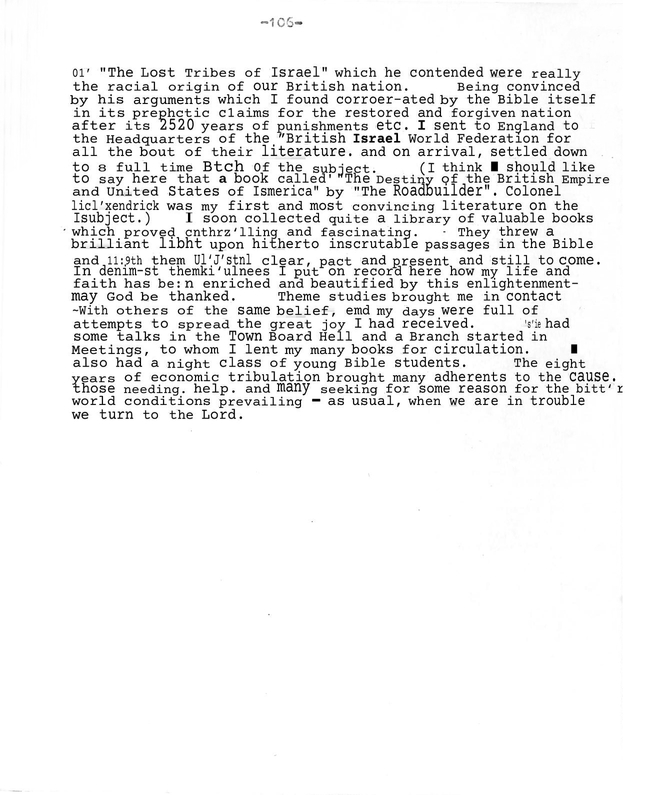
-107-
EARTHQUAKE PAGES.
Early in 1931 Hawke’s Bay suffered severely from a heavy earthquake. It was at about 11a.m. on a glorious sunny day. I was seated at my writing table in the living-room and absorbed in my occupation when the movement started, and looking up I saw the whole place rocking. A bunch of wet flowers fell from the mantelpiece behind reminding me that it was not a safe place, and I dropped on hands and knees and wriggled my way between shifting furniture, falling vases and ornaments and pictures standing out at apparently right angles overhead. I got to the door where stood my husband and maid. He had been caught upstairs laying out his garments for the big wedding we were due to attend the same day, and he had held on to the built-in wardrobe door and swayed with the building until a lull enabled him to get downstairs. We all scrambled outside and holding on to each other reached the small summer house in the garden, safe for a while from falling debris. In those few short moments, our home received all its damages (and we were very fortunate.) The three big chimney tops had snapped on the roof line and falling to earth four square and solid had ripped the tiles in their passage leaving ceilings open to the sky, a broken bath full of bricks and some other minor damage. Fortunately the expanding metal which was the basis of our rough cast house swayed with the earth movements, and with much creaking and moaning righted itself, sustaining very few cracks and damage. We had little opportunity to find out what had happened for some time. The shocks came thick and fast and the heaving ground was very hard to walk on, so we sat on the rustic seat and found time to be thankful that we were alive and uninjured. Our maid, Dolly Wilson, was a tower of strength. She kept her head and feet and ventured in and out intent on serving us without an instant’s hesitation. I would like to say here what a comforting, sensible and resourceful help she was through all the weeks, nay months, of upheaval that ensued. We would have been in a much worse plight without her. Her quick eye had caught sight of the wine decanter on the floor as she ran through the dining room on her way to find me, and when there was a short interval in the shocks, she returned to salvage it, finding sufficient wine left to steady our nerves. Our first thought was to disconnect electric lights and water pressure. Fortunately the back premises being one storey, had not been damaged, and quickly shifting the two burner kerosene stove to the wash house, Dolly transferred the pot of good strong soup which had been in preparation for our dinner to its safer fire, and extinguished the fire in the range, and thus provided us with hot food, a jug of which we later, with sticks to steady us -took to our neighbours, the Fitzroys, where we found the dear old lady sitting in a wicker chair on the lawn calming helping to direct the gardener who was already putting up a small tent with stretcher beds for herself and daughter and digging out a fireplace among the flower beds whereon

-108-
to boil a kettle. We fell on each other’s necks in gratitude for safety of life and limb. No time then to mourn over broken off tiles and houses sloping at perilous angles. Good food and shelter was one’s first consideration. There were no casualties amongst us to be attended to. My husband managed to arrange tarpaulins between two trees on the lawn backed by the dense Tacoma hedge thus forming a sleeping tent. It just held the double wire mattress from our bed raised on a brick at each corner, and here we comfortably slept for weeks. A hurricane lamp gave us light, and as we were so near the ground there was no fear of falling out of bed, and the frequent recurring shocks, while they rocked and rattled the house could not bring any part of it down upon us, so we felt comparatively safe and rested well. Dolly had a mattress in the summer house close to us, and the first night it was shared by our neighbour’s maid. These poor girls had been alone all day and in great terror as their employers had left for Hastings earlier expecting to return for lunch. Late in the day we saw a car with a wrecked hood, broken frame and torn covers, drive past and found that our great friend Roy MacLennan had been killed instantly by falling masonry, and his wife barely rescued from a burning car with injuries which necessitated her being removed to the emergency Royston Hospital and later to the Race course buildings where wards were quickly erected. We now heard for the first time of the terrible effects of the ‘quake. Napier was on fire after the falling to pieces of most of the buildings. Hastings was saved the worst, but both cities were scenes of death and desolation and though statistics quote about 280 identified bodies, the casualties were many more. Our local world and many country areas were devastated whole hillsides with their pastures and grazing sheep slipping down into the sea, there slowly to disappear. In fact, it took many months before full details were known. Oswald found his way down to see how we had fared, having to leave the boulder strewn road and cross country on foot and beg lifts etc. Fortunately all had escaped injury though Eric’s house had collapsed and they were taking refuge at Glenlyon. So the tales of disaster began to reach us. Fortunately for the many who had to sleep in tents or temporary shelters and cook in the back yards for many weeks, the weather was perfect – not one drop of rain fell for six full weeks, and so we picnicked.
Early in the morning following we awoke to see a car sweeping into the drive, and out of it came our dear girl with the husband and friends, Murray and Marjorie Orr. They had heard the news over the radio – a bit exaggerated as regards Havelock, but determined to rescue us, they travelled all night meeting refugees on the road and evidences of the happenings through Hawke’s Bay. They were very thankful to find us safe
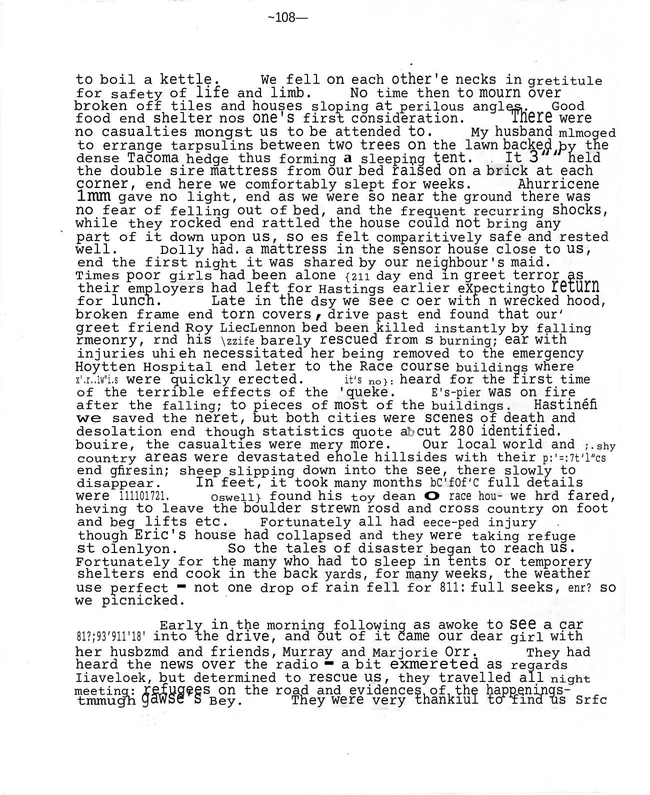
-109-
and they had brought us all the food they could find in their larder.
The quakes continued for weeks and made repairs difficult. We decided on getting a long galvanised pipe put through the broken kitchen chimney connected, with the range as a temporary expedient, which proved successful, though the workman who fixed it told us when leaving that he was not a plumber by trade, but was merely assisting a friend. His regular occupation was making artificial limbs!! The two occupations seemed divorced in our minds, but we hoped for the best and were rewarded by good service from our new type of chimney, until finding they burnt out rapidly, we changed to electricity and could do without a chimney altogether. Our girl was anxious to take us back with them, but we felt it unwise to leave our belongings without protection and before repairs could be effected, and we were glad we had so decided for there were many light fingered gentry about, and one’s property needed constant personal supervision. We were able to purchase tiles from houses whose owners had decided to discard that form of roofing. A firm from Wellington placed them, and in time we were water tight and able to feel comfortable about our belongings.
The general history of that sad time is now well known. I have merely given our personal experiences which perhaps will interest the younger generation who were mostly too young to remember the trying details of that time. Our kind relatives, the Raes, sent us much assistance towards our repairs, like the good friends they always have been, making things possible and easy, and for which we were very grateful.
In 1934 Raby Ramsey and Maud Edwards visited us again, using part of a legacy from the same cousin who left me part of her inheritance from the Aunts. We had a most unexpected and happy time together. We took a trip by car (my husband driving) to Rotorua, they going to Waitomo Caves and other outlying thermal sights which we had already seen. Then there were the families to visit, ending up at Tora Station for Xmas, which we all spent together, leaving again after New Year’s Day. They left New Zealand shortly after on their return to South Africa, but before they left we had received a wonderful invitation from H. Rae asking us to join them on their great tour on the “Empress of Britain” as their guests. A most thrilling event and impossible to decline. We were to travel to America and from there with them to England, stay with them for a while in their lovely Kentish home, visit the many relatives and return via Naples, perhaps bringing L. Rae back with us. We had to be busy now. We accepted by cable
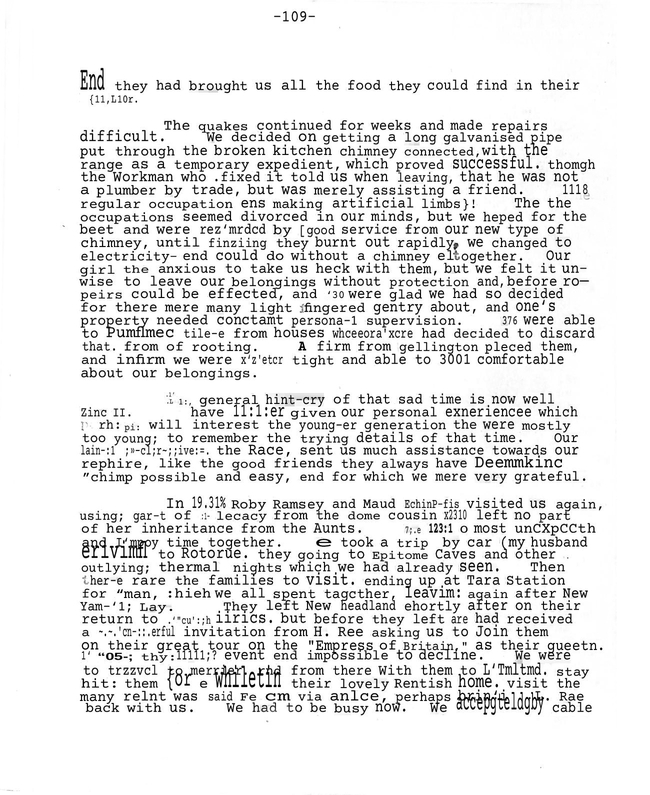
-110-
and arranged to leave New Zealand early in April. As the time approached we let the house to an invalid lady. Unhappily she was in far worse health than we anticipated and died within a week of our sailing leaving us to make other arrangements – or others had to do so. We spent the last fortnight of March at Hillsbrook boarding house resting after our strenuous efforts. We left Auckland on April 6th by the “Monteray” and began a splendid tour featuring a fortnight in Los Angeles, where we joined Herbert and May our hosts, on the “Empress of Britain”, that beautiful and wonderful palace of the sea, and went with them round to New York via Panama and Havana, and so to old England, where we stayed until September 28th then sailing by the “Orion” on her maiden voyage to Australia and leaving her at Naples, where we spent a month with L. Rae. I have left in the form of a diary a full account of this trip after leaving Auckland, and think it wise for this to be consulted and copied at this stage into these “memories”. It is full of real sight-seeing and experiences of interest to all the third generation, if the second know it by heart. (On further consideration I rescind this suggestion – it would be too voluminous.)
As the war between Italy and Abyssinia began a few days before we reached Naples, we faced a feared delay in the Canal or the Red Sea on our continued journey by “Orford” on November 6th, but though sanctions were being discussed hotly in Geneva, we got through before England and Italy came to blows, and had a fine journey but very hot, really sixteen days more or less in torrid areas. My husband and I felt the heat very much. We went to Kandy for a day’s outing in Colombo by car, the same trip to high levels in Perth to get out of the heat – Adelaide the same thing, and in Melbourne, we just stayed quietly on board. We went to North Tasmania to pick up passengers for Sydney arriving there we stayed on board until the next day before joining the New Zealand boat. Sydney was very hot and crowded and we were glad to leave it. We had a quick voyage to Wellington and we were met by Becky and family. We stayed at the Windsor Hotel and left next day by train, and were met here by Ida and M. Fitzroy. Ida had been very busy for ten days having the house papered and painted and thoroughly cleaned, new bath etc. it was a lovely homecoming and settling in and meeting all the dear ones – so ended 1935 and the next year brought many changes. There was much business to discuss re the division of Glenlyon. There were many points to decide, and it was very worrying to my husband, but beneficial to our sons. It was finally fixed and E.C. Estate divided between three sons, Ida provided for equally from mine. The whole matter took much consideration, and while relieving E.C. of land responsibilities as well as ownership, brought other and new conditions up for our consideration.

-111-
We had been expecting L. Rae on a visit early in the year, but on arriving at Perth her son did not consider her well enough to continue her journey, so she remained with them until May when Neville went to Sydney to meet her and escort her here. June saw them with us with L’s health, chiefly nervous debility, improved, but not to a great extent, and the war news was very upsetting, but we were quite a happy little family together. I had developed a nasty perpetual pain in my right arm while travelling home diagnosed as neuritis and had hoped that the hot sea baths at sea would prove a cure, but no results were noticeable, in fact the condition rather worsened and I decided to try a course of baths at Rotorua, so leaving my husband and his sister to follow later, and after consulting Dr. Bertram I started treatment, which he stated would require a month. On Tuesday the 18th Eric rang to tell me his father had been ill the previous day and Neville had sustained a serious accident being thrown and rolled on by his horse, and his condition was very serious and an operation imperative. I quickly made arrangements to return next day. Then ensued a long period of anxiety, and terrible suffering on the part of my dear ones. Two nurses were necessary for my husband and every day one or another visited Neville in Hospital where he fought for his life. A most nerve wracking time, through which by God’s Mercy and much skill, our dear ones were restored to life. By Christmas E.C. was able to drive his nurse to her home. In January we decided to recuperate at Rotorua and to resume my interrupted treatment for neuritis which had not improved under the strain imposed by months of anxiety. My husband was a keen bowler and over-tired himself, bringing on relapse of his illness which necessitated his removal to a private hospital where another time of anxiety and suffering ensued. All were very kind, and I kept up the daily baths, massage etc., but it did not seem very successful in my case, and when we finally returned home, I found myself the invalid. I expect most reactions which were natural to a woman in her eightieth year. The same anxieties had upset our sister L. Rae, and brought on a return of her nervous complaint and by June she left for America with a friend who came to travel with her.
In March of the year 1937 N.C. remarried and about the same time I gave in and had a long time of treatments of various sorts, pyretic baths and rays specially, which in course of time put an end to my condition and by 1939 I was obviously a well old woman.
Then came an unexpected pleasure when M. Edwards cabled us that she was visiting us en route to England, and March saw her here. We had a very happy time which I interrupted by slipping on the porch step and breaking my right arm necessitating hospital. Fortunately X rays showed the break as a socket
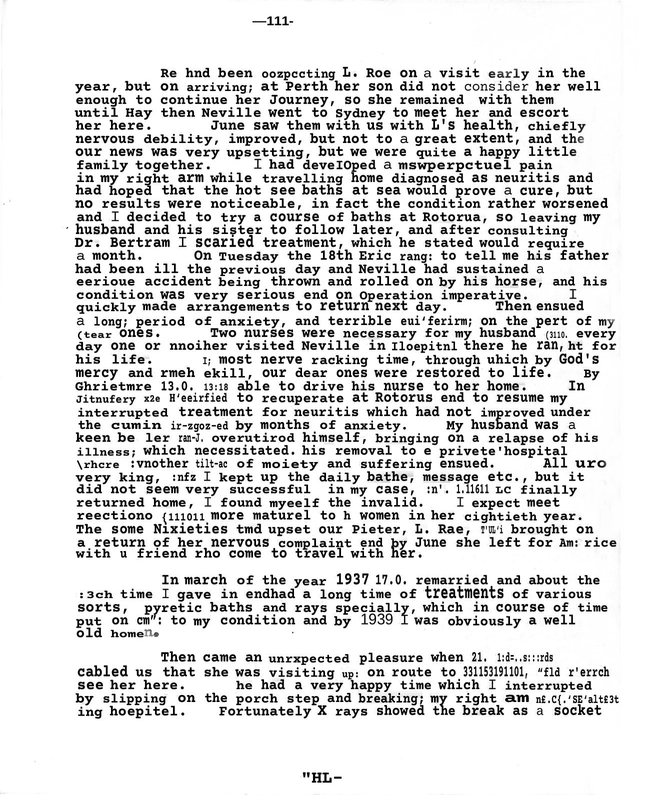
-112-
clean, all ready set to mend, and it did without any trouble. M. Edwards had to leave us early in June to continue her journey and I returned home in a nurse’s care. By the end of August I had the use of the arm and one bright afternoon suggested that we should celebrate by going to tea in town. Alas for plans! We had not proceeded far when the car began to shudder and shake and the wheel fell off and we turned into a ditch, with broken glass all over us. I got a nasty blow on the chest and a broken left wrist. My husband had bruises and many cuts from broken glass. We were able to walk into a kindly house until a Doctor and ambulance arrived, and it was hospital again for us. This time I had a plaster of paris setting until healed. Much more comfortable than the first form. My nurse in the car had hurt her knee unfortunately and was much longer recovering from its effect than I was myself.
Both my husband and myself were in Hospital when War was declared. I have a note he wrote me on my birthday when we were in hospital and gave to the nurse to deliver between our rooms early in the morning. It was so typical of him and our relationship through so many years, that I copy it for our children to read : –
“Many Happy returns to my dear old mate of nearly 60 years. May God give us a little more time together. Ever your loving hubby, E.C. Clarkson. “
Thank God his wish was granted, and on the 15th October 1939 that same year, we celebrated the 60th Anniversary of our Wedding Day. We were both restored to health and surrounded by all our children and many old friends, the former entertaining us right royally in the Carlton Club Lounge with many gifts and kindest congratulations. How many the intervening years had been and how few they seemed! How much we had to be thankful for, and how proud we were of our children and theirs who surrounded us that day, and blessed our union.
And now my record is drawing to a close. Difficulties brought by war conditions affected all.
As 1941 and 1942 passed on my dear one grew weary of waiting. He had an attack of bronchitis in the winter, then a bright spell and we had decided on a holiday in Rotorua before the Xmas rush and had a letter written to secure accommodation on his desk, when he awoke to pain. He thought it was lumbago then fibrocitis [?] and suffered greatly. He had massage and we had a splendid nurse who was all he wished for, and then there had to be two and he just longed for peace and asked not to be held back until the end came, and he left us in the early dawn of January 30th 1942 in his 88th year. Now I am alone awaiting my
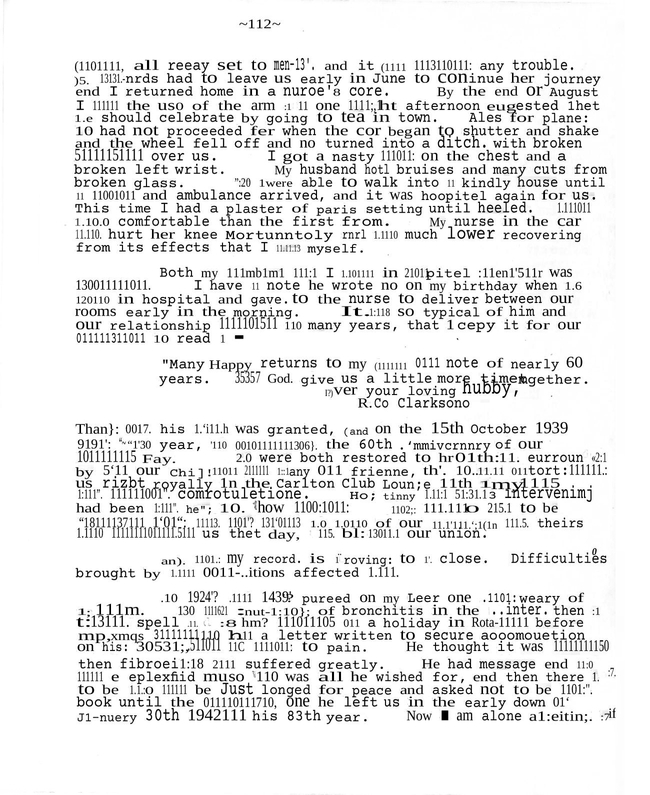
-113-
call with kind, loving children and grandchildren, and my beloved companion who has been with us now for four years, and I am surrounded by every comfort in our loved home. The war has reached a new stage, and we look for God’s judgments coming to an end. What I shall see, He only knows. There must be some use for me or I would not still linger on.
I have interested myself in writing these memories and have tried to keep as much as possible to real happenings and apart from individual reactions and characteristics, and I wonder much if they will be of interest as I hoped when I began. I trust there is no word that will hurt or wound.
The War which is still raging has changed our whole world and its outlook, which I suppose is what it was intended to do. All that such as I can do is just simply to pray for all who do His Will, and even those who have not yet learned to put their trust in Him. May my dear ones all be His now and in the days to come, when the Righteous shall see God in that World of which we know so little, and that by Faith and Hope so much, may we meet there at last to part no more.
ALICE BLANCHE CLARKSON
(Born Coleman)
1857.
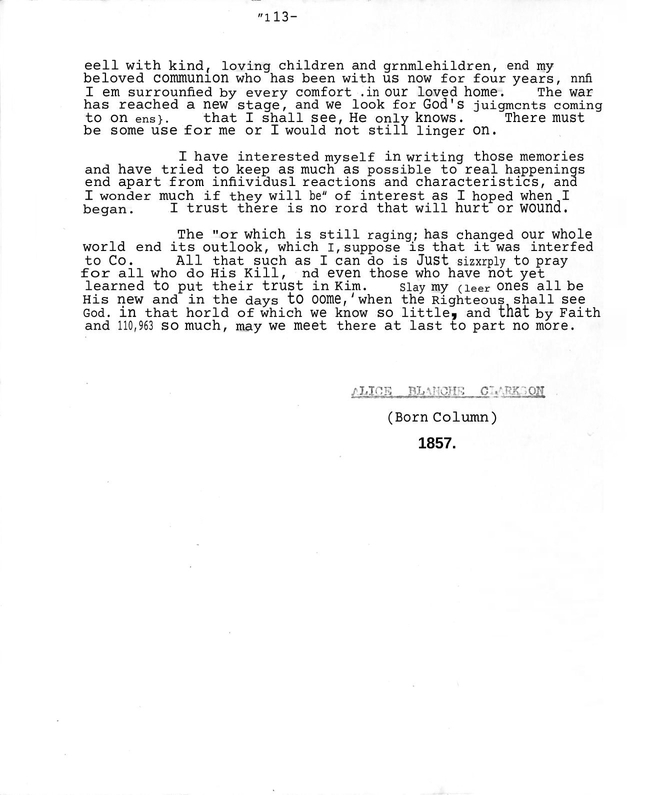
Non-commercial use

This work is licensed under a Attribution-NonCommercial 3.0 New Zealand (CC BY-NC 3.0 NZ).
Commercial Use
Please contact us for information about using this material commercially.Can you help?
The Hawke's Bay Knowledge Bank relies on donations to make this material available. Please consider making a donation towards preserving our local history.
Visit our donations page for more information.
Description
Eleven people from four families arrived in Wellington 5 October 1898 on the “Kaikoura” – Alice’s family (Alice, Edward, Ida, Neville, Oswald, Eric), her sister Mina’s children (Raby, Maud, Arthur), her sister Aggie, her brother Spencer Coleman’s daughter Becky
Raby, Maudie, Arthur, Jeff, Thomas and William are the children of Alice’s sister, Mina Edwards
Aggie is the sister of Alice
Other surnames in this memoir –
Colart, Currie, Fitzroy, Forbes, Gavin, Grey, Hayward, Henley, Jameson, McEvoy, Ogilvie, Orr, Powdrell, Quartley, Stannard
[Note from HB Knowledge Bank – it is normal practice for a transcription to be an exact copy of the original but in this case, the original was so poorly typed and is so full of errors that it is hard to read; in this case, any deviations from the original are indicated by italics in the transcript.]
Subjects
Format of the original
Bound, typed diaryDate published
1944Creator / Author
People
- Sister Anderson
- Captain Baillie
- Emily Batley
- Norah Biddle
- Nelson Cherer
- Charles, Derek John, Douglas, Hugh Neville, Marjorie Alice, May, Wilcocke Clarkson
- E Clarkson
- Eric Clarkson
- Neville Clarkson
- Oswald Clarkson
- Agnes (Aggie), Becky, Mary Ellen, Spencer Charles Coleman
- Mr and Mrs W H Coleman
- David, F and Sam Cooke
- Kitty Downing
- Arthur, Jeffrey, Maud, Mina Ellen, Ray, Tom, William Edwards
- Archie Gavin
- Sylvester Lister
- Emily Macdonald
- Roy McLennan
- D McLean
- M E McLean
- Miss Jenny Mitchell
- A J Petherick
- C, Francis, Herbert, Leonard, Louisa, May Rae
- H B Ramsey
- M Riddiford
- Olive, Ronald Taylor
- Miss Ruth Waterhouse
- Clement H Wilson
- Dolly Wilson
- Ida Wilson, nee Clarkson
- Joan Blanche Wilson

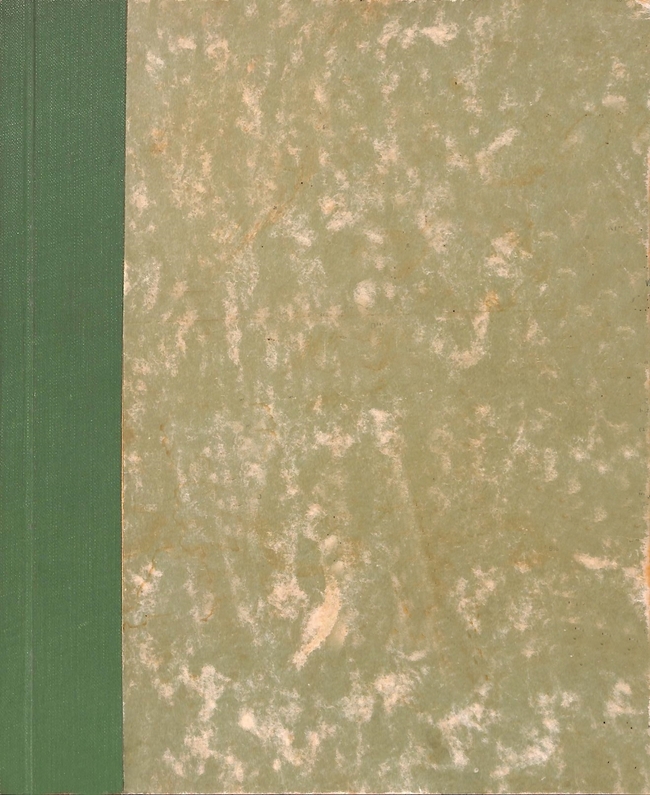











Do you know something about this record?
Please note we cannot verify the accuracy of any information posted by the community.